 The purpose of the Unit for the Study of Personality in Politics Media Tipsheet is threefold. First, it offers political reporters looking for a fresh story angle a sometimes unique, often unconventional perspective on politics. Second, it serves as a repository for research-based political analysis. Analyses and predictions in the Tipsheet are, in effect, research hypotheses to be tested prospectively against actual event outcomes, which in turn serve to refine the guiding theory of personality and leadership that informed the analysis and prediction in the first place. Third, the Tipsheet aims to provide voters and reporters with politically unbiased, nonpartisan insights into aspects of candidates’ personal character likely to impinge on their public lives, campaign style, policy preferences, and leadership prospects.
The purpose of the Unit for the Study of Personality in Politics Media Tipsheet is threefold. First, it offers political reporters looking for a fresh story angle a sometimes unique, often unconventional perspective on politics. Second, it serves as a repository for research-based political analysis. Analyses and predictions in the Tipsheet are, in effect, research hypotheses to be tested prospectively against actual event outcomes, which in turn serve to refine the guiding theory of personality and leadership that informed the analysis and prediction in the first place. Third, the Tipsheet aims to provide voters and reporters with politically unbiased, nonpartisan insights into aspects of candidates’ personal character likely to impinge on their public lives, campaign style, policy preferences, and leadership prospects.
December 27, 2016
Would Barack Obama beat Donald Trump in a hypothetical matchup?
President Barack Obama, in a Dec. 26 interview with David Axelrod for his “Axe Files” podcast produced by CNN and the University of Chicago’s Institute of Politics, suggested that, had he been able to run, he could have won a third term in the White House.
“I am confident that … if I had run again … I think I could’ve mobilized a majority of the American people.”
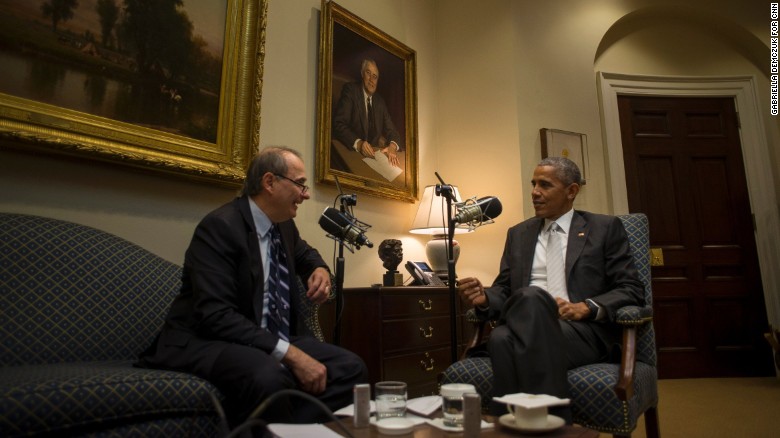
President Barack Obama is interviewed on “The Axe Files” from CNN and the University of Chicago Institute of Politics, Dec. 26, 2016. (Photo: Gabriella Demczuk / CNN)
Fox News reports that President-elect Donald Trump fired back in a tweet: “President Obama said that he thinks he would have won against me. He should say that but I say NO WAY!”
The Presidential Electability Index (PEI) developed at the Unit for the Study of Personality in Politics (USPP), which has accurately predicted the outcome of every presidential election since 1996, suggests that Donald Trump would beat Barack Obama in a hypothetical presidential election matchup.
Research on the psychology of politics conducted at the USPP reveals that voters respond favorably to candidates who are outgoing (extraverted), self-confident (productively narcissistic), and dominant; and negatively to candidates who are introverted and overly conscientious. Based on those criteria, Trump has the edge over Obama, as shown by the PEI political impact scores below:
Donald Trump: PEI = 65
Scale: 1A 1B 2 3 4 5A 5B 6 7 8
Score: 17 9 24 24 0 0 4 0 0 0
Scale: 1A = 17; 2 = 24; 3 = 24; 6 = 0; 8 = 0
[Extraversion (scale 3) = 24] + [Narcissism (scale 2) = 24] + [Dominance (scale 1A) = 17] – [Introversion (scale 8) = 0] – [Conscientiousness (scale 6) = (2 – 2) = 0] = 65 – 0 = 65
Donald Trump: PEI = 45 (dysfunctionality adjusted)
Scale: 1A 1B 2 3 4 5A 5B 6 7 8
Score: 15 11 15 15 1 0 6 2 1 0
Scale: 1A = 15; 2 = 15; 3 = 15; 6 = 2; 8 = 0
[Extraversion (scale 3) = 15] + [Narcissism (scale 2) = 15] + [Dominance (scale 1A) = 15] – [Introversion (scale 8) = 0] – [Conscientiousness (scale 6) = (2 – 2) = 0] = 45 – 0 = 45
Barack Obama: PEI = 28
Scale: 1A 1B 2 3 4 5A 5B 6 7 8 9 0
Score: 10 6 11 9 7 1 2 5 4 1 0 4
Obama: [Extraversion (scale 3) = 9] + [Narcissism (scale 2) = 11] + [Dominance (scale 1) = 10] – [Introversion (scale 8) = 1] – [Conscientiousness (scale 6) = (5 – 4)] = 28
—————————————————————————————————————
PEI Scores for Democratic and Republican Nominees, 1996-2016
For historical context, here are the personality-based electability scores for all major-party nominees since 1996, published before Super Tuesday in presidential election years, with the successful candidate listed first:
- 1996: Bill Clinton 37, Bob Dole 15
- 2000: George W. Bush 31, Al Gore -17
- 2004: George W. Bush 31, John Kerry 9
- 2008: Barack Obama 28, John McCain 26
- 2012: Barack Obama 10, Mitt Romney 6
- 2016: Donald Trump 65, Hillary Clinton 27
December 20, 2016
Presidential Electability Index predicted Donald Trump win
Minnesota Professor Predicted Trump’s Win

College of St. Benedict/St. John’s University professor Aubrey Immelman, who predicted Donald Trump would win over Hillary Clinton based on their personality profiles, shown Wednesday, Nov. 16, 2016. Immelman has predicted presidential winners correctly for the past 20 years. (Photo: Jason Wachter / St. Cloud Times)
By Kirsti Marohn
St. Cloud Times
November 19, 2016
Pollsters almost universally were wrong about the outcome of the 2016 election, but one local political psychology professor accurately predicted as early as March that Donald Trump would win the presidency.
Aubrey Immelman, who directs the Unit for the Study of Personality in Politics at the College of St. Benedict/St. John’s University, developed a model that uses a candidate’s personality traits to determine how electable they are. Immelman’s model has accurately predicted the winner of the last six presidential elections.
What’s surprising is that Immelman picked Trump last spring as the only candidate from the crowded field of Republican contenders who could beat Hillary Clinton. The St. Cloud Times published a story in March about Immelman’s findings, which even he wasn’t sure he believed.
“Considering what the polls were saying and just looking at how volatile, even unpredictable Trump was, I thought, ‘Well, maybe this time I’ll be wrong,’ ” Immelman said.
When Immelman and his research students first met in June 2015 to decide which candidates to profile, they picked five Republicans they thought were the most viable, including Jeb Bush, Ted Cruz and Marco Rubio. On a whim, Immelman suggested including the New York real estate mogul whose presidential bid seemed like a long shot.
“I said, ‘Hey, why don’t we do Trump?’ ” Immelman recalled. “We all laughed. I laughed the hardest.”
Immelman’s model uses candidates’ personality traits to predict which contender will resonate most favorably with independent voters, who make up roughly one-third of the electorate and frequently base their choice primarily on a candidate’s personal qualities rather than party allegiance.
The model looks at some key personality traits that voters respond positively to during campaigns, including whether a candidate is introverted or extraverted and how narcissistic, dominant and conscientious they are.
Trump and Clinton scored equally high on narcissism, while Clinton scored slightly higher on dominance than Trump, Immelman said.
However, while Trump scored very high as an extravert, Clinton is far more introverted, Immelman said. Introverted candidates — past examples include Al Gore and Jeb Bush — have more difficulty interacting with people on the campaign trail.
And Clinton is highly conscientious, but Trump scored close to zero, Immelman said. While conscientiousness might be an admirable trait in a president, it’s not always an attractive feature in a candidate.
“She’s very prepared and programmed, and very prudent and cautious,” he said.
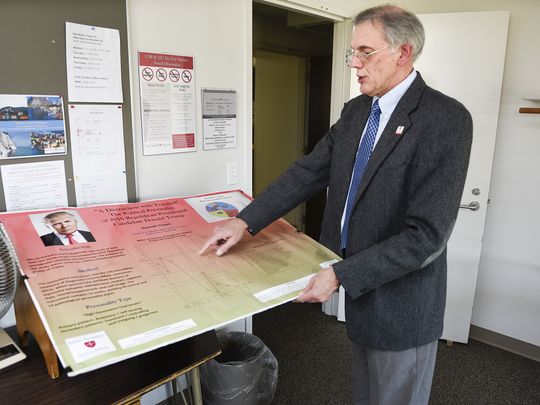
College of St. Benedict/St. John’s University professor Aubrey Immelman describes his personality profile of Donald Trump Wednesday, Nov. 16, at CSB. (Photo: Jason Wachter / St. Cloud Times)
Immelman wasn’t sure about his findings. His model assumes that all the candidates are vetted politicians who have served in Congress or as governor. He wondered how it might be affected by Trump’s unconventional background.
“It turned out it was pretty robust, which makes it a pretty powerful predictor, I think,” he said.
Although most major polls inaccurately predicted a Clinton win, Immelman notes that he wasn’t the only academic who used social science models to get it right. He points to Allan Lichtman, a political historian at American University, and Helmut Norpoth, political science professor at Stony Brook University, who both projected a Trump victory.
Immelman calls his model simplistic, and said he’s never even considered it scientifically significant enough to have it reviewed by peers. He acknowledges that many factors, not just personality, played a role in Trump’s win.
“It’s not the only factor that played a role,” Immelman said. “But I think it played a stronger than normal role, and there’s no way that the polls can account for personality variables.”
Immelman notes that his model only predicts the ability of a candidate to get elected, not how well they will do in office.
“When it comes to governing, actually, I don’t think it predicts success,” he said.
—————————
Related interest
2016 Election Oracles: These People Predicted Trump Would Win
By Jessica McBride
Heavy
November 12, 2016
Meet the election oracles … they predicted Donald Trump’s rise. They’re mostly professors, although two pollsters also got it right, and one media personality (Michael Moore). Some are economics researchers.
The lofty, slick, and respected forecasting sites – The New York Times’ Upshot, Nate Silver’s FiveThirtyEight – got it wrong, overwhelmingly prognosticating that Hillary Clinton would win the election (although Silver was closer than others). The Upshot thought Clinton had an 85% chance, and most of the pundits and pollsters generally agreed. …
However, not everyone got it wrong. Some professors and pollsters proved to be election day oracles. Many of them report being ridiculed, insulted, and labeled as crazy – until the actual results came in, that is. …
December 13, 2016
Rick Perry nominated for Energy secretary
President-elect Donald Trump has nominated former Texas Gov. Rick Perry — a contender for the Republican nomination in the 2012 and 2016 presidential elections — to serve as secretary of the U.S. Department of Energy.
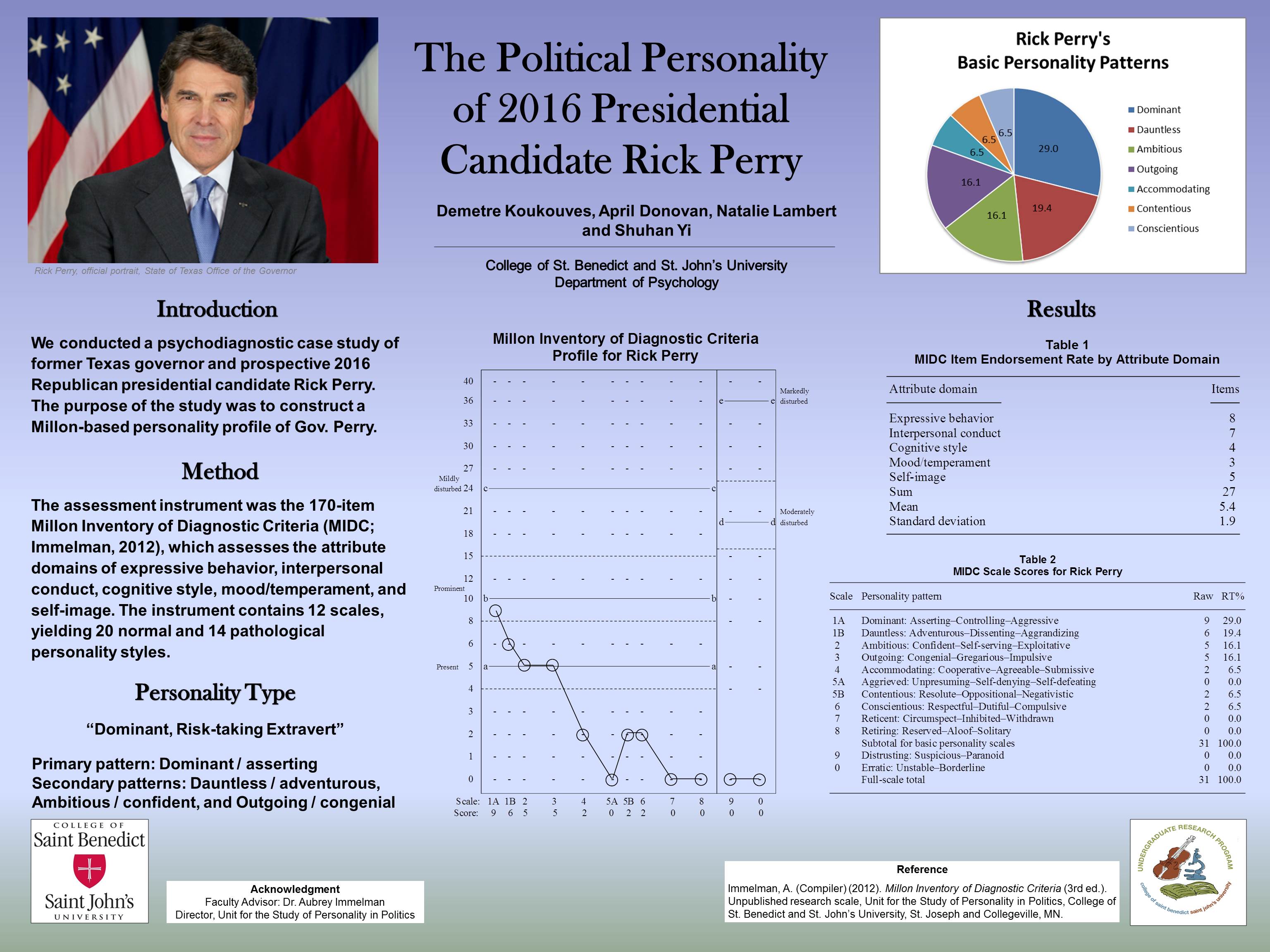
Click on image for larger view
A psychological analysis of former Texas governor Rick Perry by Demetre Koukouves, April Donovan, Natalie Lambert, Shuhan Yi, and Aubrey Immelman, Ph.D., at the Unit for the Study of Personality in Politics, revealed that Perry’s primary personality pattern is Dominant/asserting, complemented by secondary Dauntless/adventurous, Ambitious/confident, and Outgoing/congenial features. In summary, Perry’s personality composite can be characterized as a dominant, risk-taking extravert.
December 5, 2016
Ben Carson nominated for Housing and Urban Development secretary
President-elect Donald Trump has nominated retired pediatric neurosurgeon Dr. Ben Carson — a contender for the Republican nomination in the 2016 presidential election — to serve as secretary of the U.S. Department of Housing and Urban Development.
“Ben Carson has a brilliant mind and is passionate about strengthening communities and families within those communities. … He is a tough competitor and never gives up,” Trump said in a statement.
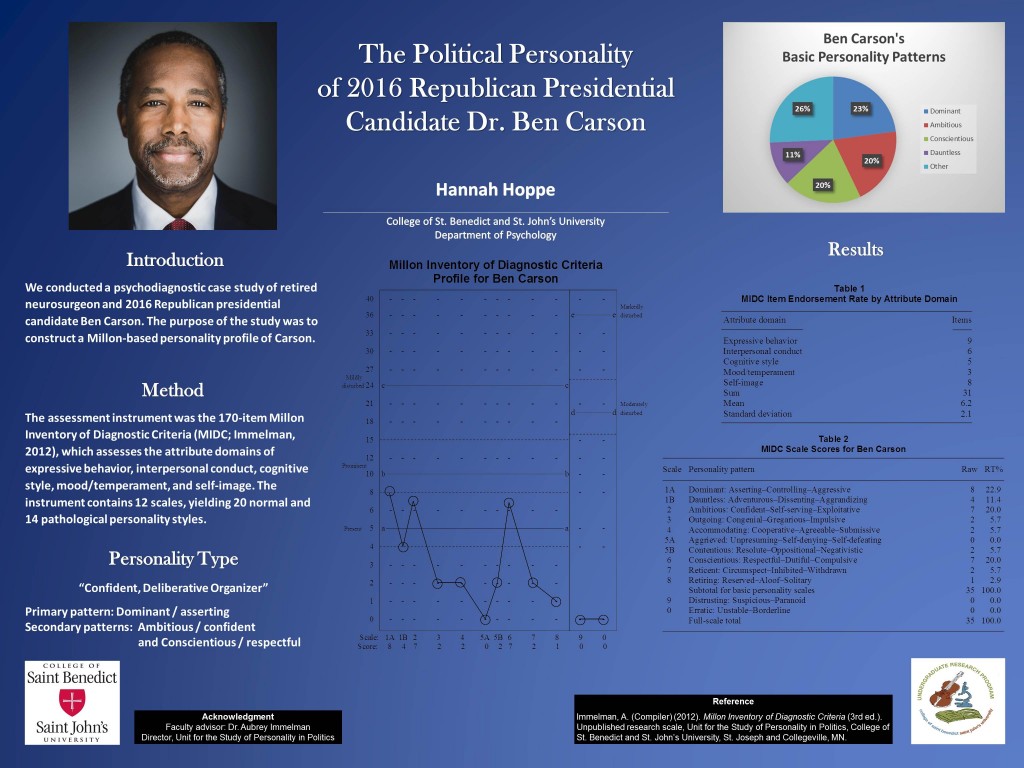
Click on image for larger view
A psychological analysis of Ben Carson by Hannah Hoppe and Aubrey Immelman, Ph.D., at the Unit for the Study of Personality in Politics, revealed that Carson’s most prominent personality patterns are Dominant/assertive, Ambitious/confident, and Conscientious/respectful. In summary, Carson’s personality composite can be characterized as a confident, deliberative organizer, suggesting a well-balanced, even-keeled personality relatively flexible in the ability to respond adaptively to a broad range of situational demands.
November 27, 2016
‘A question of temperament: Donald Trump’s fitness to lead’
“Trump’s personality raises red flags” by Aubrey Immelman (St. Cloud Times, Nov. 27, 2016) » http://www.sctimes.com/story/opinion/2016/11/26/trumps-personality-raises-red-flags/94335366/
November 23, 2016
Fitness to lead? Donald Trump’s presidential temperament
Regarding President-elect Donald Trump’s fitness to lead, a promising sign is that he has shown a willingness to surround himself with level-headed, competent advisers capable of smoothing the rougher edges of his personality — foremost among them campaign manager Kellyanne Conway and White House Chief of Staff designate Reince Priebus.
Imminently, the next big test for Trump is whether he can resist the impulse to appoint top campaign surrogate and loyalist Rudy Giuliani — whose personality limitations parallel and amplify those of Trump — to the key cabinet post of secretary of state, fourth in the presidential line of succession.
Trump would be well advised to swallow his pride and show strength of character — which in the course of the transition he has already shown himself to be capable of — and give the nod to his harshest critic in the Republican establishment, Mitt Romney. The very temperamental blandness that made Romney a weak presidential candidate makes him an exceptional choice for the top cabinet post in the Trump administration — the protestations of many Trump supporters, chief among them Newt Gingrich and Mike Huckabee, notwithstanding.
That would be a true test of presidential character.
More » The Political Personality of 2016 Republican Presidential Nominee Donald J. Trump. Working paper, Unit for the Study of Personality in Politics, St. John’s University/College of St. Benedict, October 2016. Abstract and link for full-text (31 pages; PDF) download at Digital Commons: http://digitalcommons.csbsju.edu/psychology_pubs/103/
November 20, 2016
What role for Rudy Giuliani in Trump administration, if not Secretary of State? … Chris Christie White House role uncertain … Rick Perry for Energy Secretary?
Former New York mayor Rudy Giuliani, a contender for the Republican nomination in the 2008 U.S. presidential election, has been floated as a prospect for nomination as U.S. Secretary of State in the Trump administration — and Giuliani has expressed strong interest in this key cabinet post.
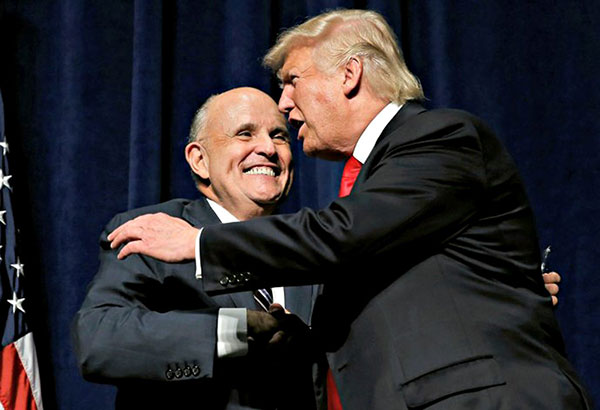
New York City mayor Rudy Giuliani introducing Donald Trump at an October 2016 campaign rally. (Photo credit: Associated Press)
Studies of Giuliani were conducted at the Unit for the Study of Personality in Politics in 1999-2000 when he briefly run against Hillary Clinton for U.S. Senate and in 2007-2008 when he ran for the GOP presidential nomination in the 2008 Republican primary.
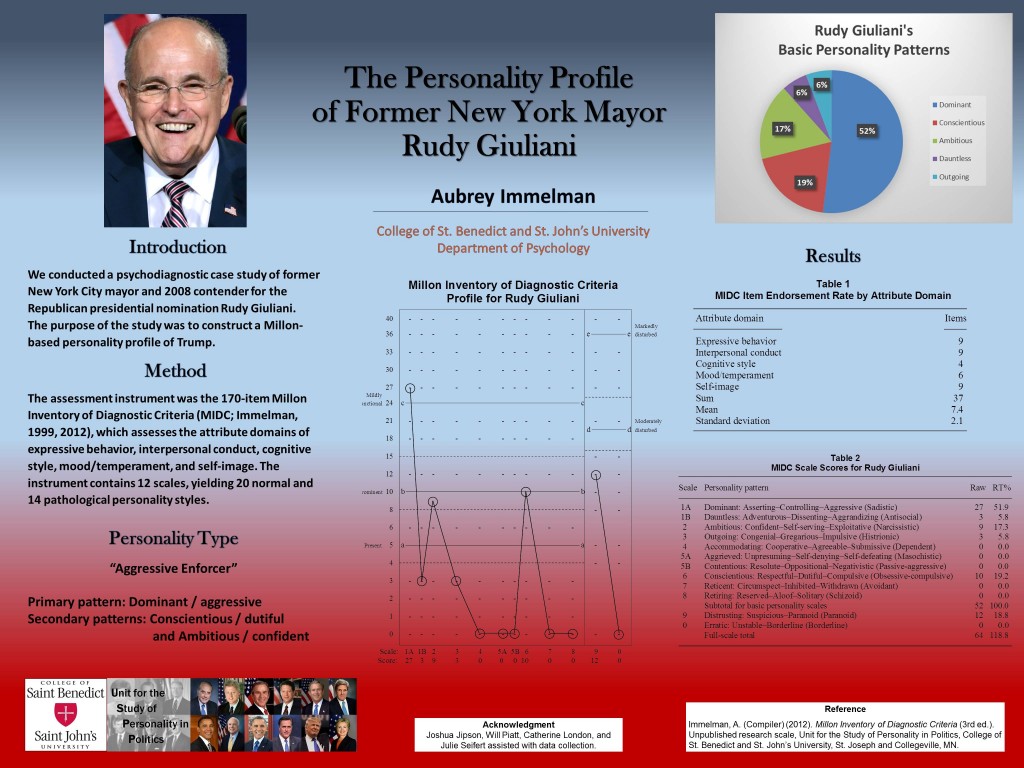
Click on image for larger view
Empirical analysis of the data revealed that Giuliani’s primary personality pattern was Dominant/aggressive, with secondary features of the Conscientious/dutiful and Ambitious/confident patterns. The combination of highly dominant and conscientious patterns in Giuliani’s profile suggests an aggressive enforcer personality composite.
Leaders with that particular personality profile are characteristically tough and uncompromising, with a forceful style that permits them to take charge in times of crisis; however, they are not known for being very diplomatic — even in these turbulent times presumably still an asset with some currency in the arena of foreign affairs.
Giuliani’s major personality strength in a high-level leadership role is a forceful, commanding personality style that permits him to take charge in times of crisis and inspire public confidence. His major personality-based limitation is a controlling, occasionally punitive, tendency to control (which may foster divisiveness and animosity).
Based on his psychological profile, Mayor Giuliani would be a riskier choice for Secretary of State than Gov. Mitt Romney, despite the fact that Giuliani is close to Donald Trump and played a pivotal role as a key surrogate in the president-elect’s successful election campaign.
Considering his personality profile and leadership experience in the wake of the 9/11 terrorist attack and its aftermath, Rudy Giuliani would be better suited as Secretary of Homeland Security.
More » The Political Personalities of 2008 Republican Presidential Contenders John McCain and Rudy Giuliani. Paper presented at the 30th Annual Scientific Meeting of the International Society of Political Psychology, Portland, OR, July 4–7, 2007. Abstract and link for full-text (30 pages; PDF) download at Digital Commons: http://digitalcommons.csbsju.edu/psychology_pubs/28/
———————————————————————
Chris Christie White House role uncertain
It is unclear what if any role New Jersey Gov. Chris Christie, who is being interviewed by the Trump transition team at Donald Trump’s Bedminster golf club in New Jersey today for a possible appointment, might play in the Trump administration — especially in view of the ongoing fallout from the Bridgegate scandal.
The Personality Profile of 2016 Republican Presidential Candidate Chris Christie (Aug. 16, 2015)
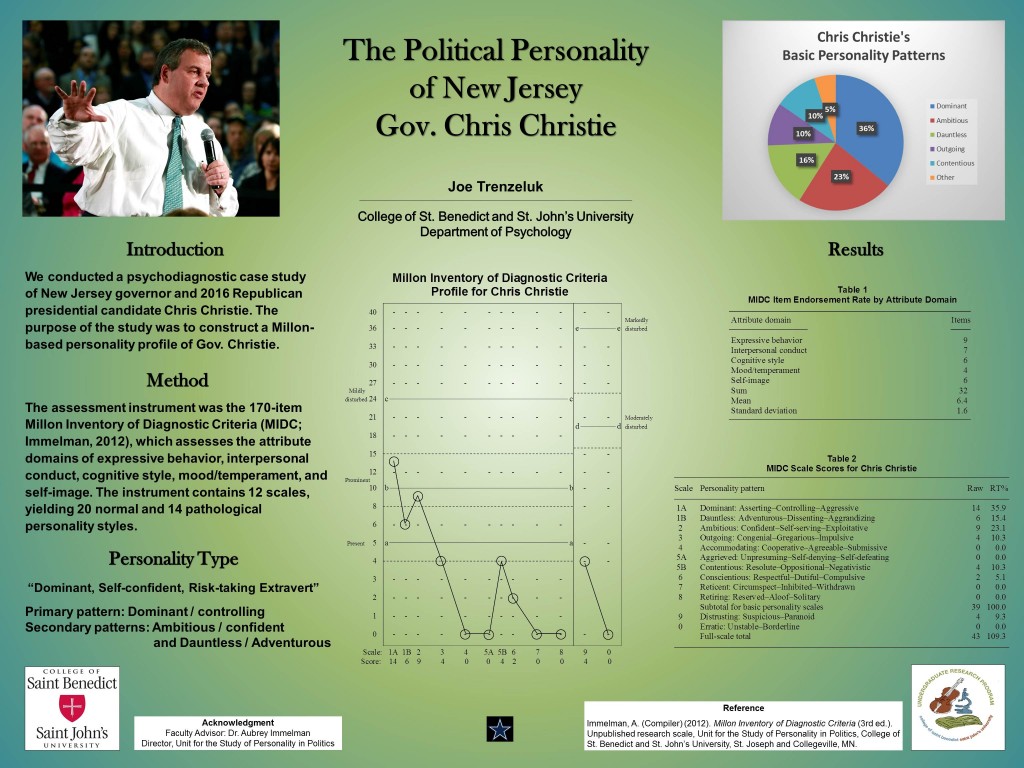
Click on image for larger view
A psychological analysis of New Jersey governor Chris Christie — a contender for the Republican nomination in the 2016 presidential election — by Joe Trenzeluk and Aubrey Immelman, Ph.D., at the Unit for the Study of Personality in Politics, revealed that Christie’s primary personality pattern is Dominant/controlling, with secondary Ambitious/confident and Dauntless/adventurous features, along with Outgoing/congenial and Contentious/resolute tendencies. In summary, Christie’s personality composite can be characterized as a dominant, self-confident, risk-taking extravert.
——————————————————————————————
Rick Perry under consideration for Energy Secretary
President-elect Donald Trump will meet meet Monday with former Texas Gov. Rick Perry, who is reportedly under consideration for Secretary of Energy or Secretary of Defense in the Trump Cabinet.
The Personality Profile of 2016 Republican Presidential Candidate Rick Perry (April 24, 2015)
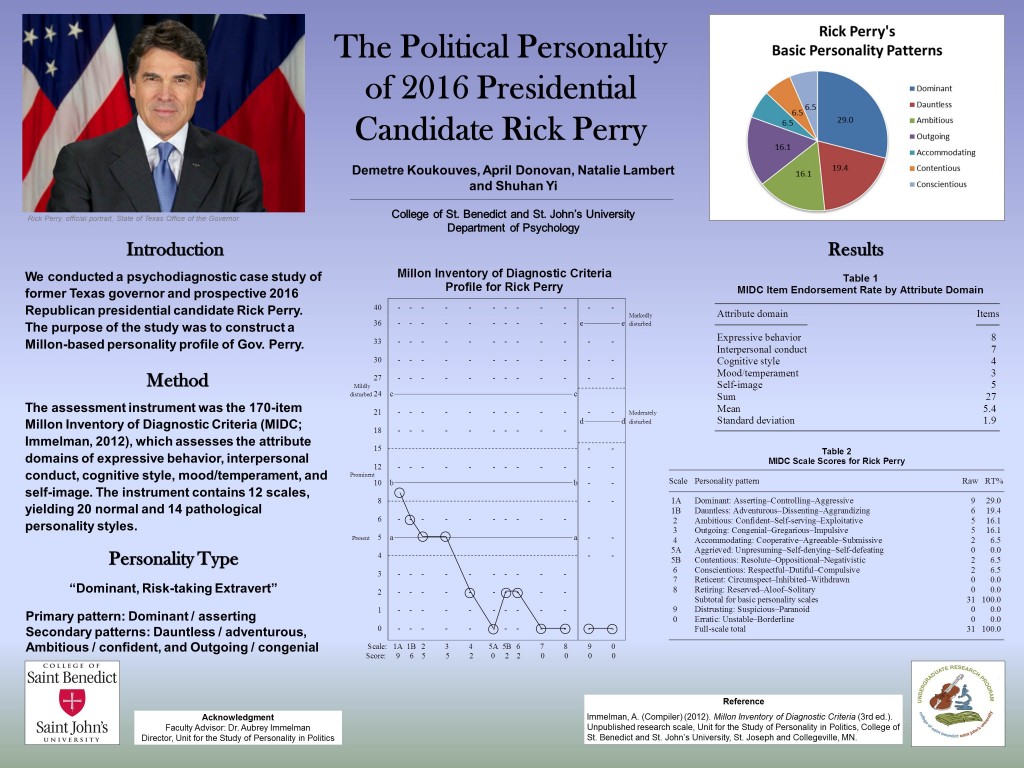
Click on image for larger view
A psychological analysis of former Texas governor Rick Perry — a contender for the Republican nomination in the 2016 presidential election — by Demetre Koukouves, April Donovan, Natalie Lambert, Shuhan Yi, and Aubrey Immelman, Ph.D., at the Unit for the Study of Personality in Politics, revealed that Perry’s primary personality pattern is Dominant/asserting, complemented by secondary Dauntless/adventurous, Ambitious/confident, and Outgoing/congenial features. In summary, Perry’s personality composite can be characterized as a dominant, risk-taking extravert.
Related reports on Rudy Giuliani
Giuliani’s Past is Glimpse of Future

Mayor Rudy Giuliani (right) at Ground Zero following the 9/11 attacks, with Secretary of Defense Donald Rumsfeld, Nov. 14, 2001. (Photo: Robert D. Ward / Office of the Secretary of Defense, Public Affairs)
By Catherine London (with Aubrey Immelman)
St. Cloud Times
November 29, 2007 (p. 8B)
Excerpts
In the wake of 9/11, Giuliani’s dominant personality pattern allowed him to capture the public imagination, demonstrating strength in the face of adversity. Yet before the terrorist attacks, the name Rudy Giuliani often conjured images of an unyielding, contentious, prickly mayor nastily denouncing his critics and spitefully retaliating against reporters who dared to pose “moronic” questions to the hardheaded, outspoken “Emperor of the City.”
Giuliani’s forceful, uncompromising manner, though in many ways an asset in his quest to wrest control of the mean streets of New York City from lawless elements, served as a double-edged sword as the public witnessed a voracious appetite for belittling opponents with derisive social commentary. Despite his successes as mayor, Giuliani had developed a reputation for his overbearing and abrasive style, occupying the role of theatrical antagonist on the public stage as New Yorkers watched his fiery outbursts play out against the backdrop of the city.
Giuliani’s forceful rhetoric and oversized personality once again took center stage in the aftermath of 9/11, but this time for the public good. His commanding, authoritative presence, which had sparked so much controversy during his mayoralty, now served him well as he rallied America from his perch atop the rubble of ground zero. …
Throughout Giuliani’s years in the public spotlight, he consistently demonstrated strength of leadership and a commanding presence, which allowed him confidently to take the helm in times of crisis. These qualities are rooted in a personal dynamic best described as an “aggressive enforcer” — a personality composite given substance by a sometimes volatile combination of aggressive dominance verging on hostility and an almost obsessively conscientious tendency that shades into self-righteous rigidity. …
————————————————
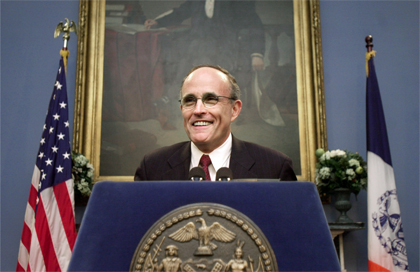
New York major Rudolph Giuliani holding a news conference at City Hall, April 27, 2000.
By Aubrey Immelman
St. Cloud Times
June 4, 2000 (p. 9B)
Excerpts
Claims of a new Rudy notwithstanding, logic dictates that Giuliani remains the dominant, controlling, aggressive personality whose combative orientation was as instrumental to his successful track record as a prosecutor as it has been in his crusade to clean up the streets of New York City.
But personality style can be a double-edged sword. During his tenure in the mayor’s office, Giuliani has shown a potential for self-defeating rigidity and an unwillingness to compromise, with a penchant for berating his critics and assailing subordinates not acting fully in accordance with his wishes.
While those qualities may be effective in getting the job done in New York City, such fiery zeal may not be the right stuff for success in the U.S. Senate, revered by some as “the world’s greatest deliberative body.”
Giuliani may be better suited for an executive position such as mayor or governor, but the venerable legislative body that is the U.S. Senate is no place for a bellicose brawler in which to advance his political ambitions. …
—————————————————————
Senate Would Test Giuliani’s Resolve
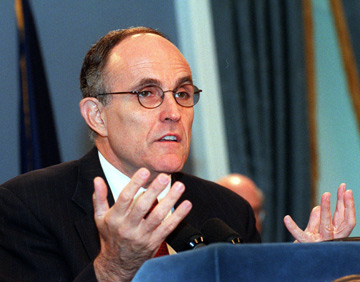
New York mayor Rudy Giuliani
By Joshua Jipson and Will Piatt (with Aubrey Immelman)
St. Cloud Times
December 12, 1999 (p. 9B)
Excerpts
The dominant feature of Rudy Giuliani’s personality is a controlling, aggressive tendency, which is an attribute instrumental in his past political successes. …
Our main concern with Giuliani is his larger personality configuration. When a prominent aggressive tendency combines with moral certitude, the resulting personality prototype is the “hostile enforcer.” …
It’s no secret that Giuliani has harbored long-standing presidential ambitions. … But as president, his hostility would have global implications. Diplomacy, a vital tool in foreign policy, is not a prevalent trait in personalities such as Giuliani’s. …
Recently, the New York Observer asked, “Can Rudy Giuliani tame the beast within?” Let’s hope he can, for should he fail, the fire he spouts may scorch not only Washington, but instigate a larger conflagration. …
November 19, 2016
Mitt Romney for Secretary of State?
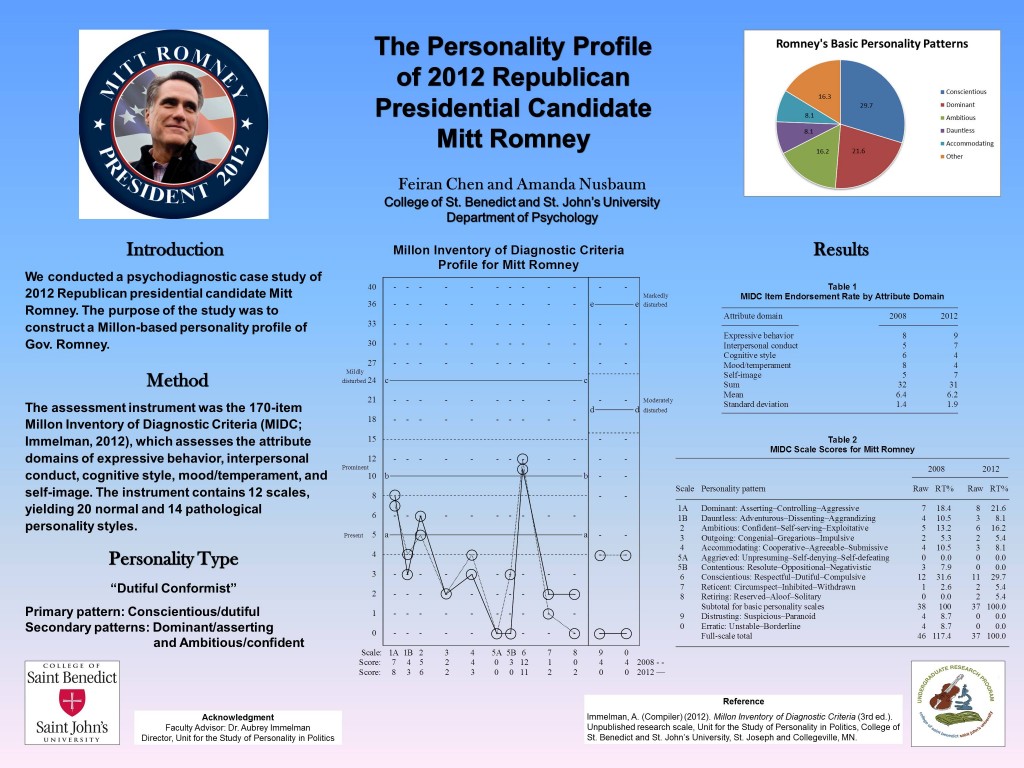
Click on image for larger view
Former Massachusetts Gov. Mitt Romney, Republican nominee in the 2012 U.S. presidential election, is being touted as a prospect for nomination as U.S. Secretary of State in the Trump administration.
President-elect Donald Trump will meet this weekend with one of his fiercest critics: 2012 Republican nominee Mitt Romney, a discussion that could include the position of secretary of state. … Romney has long told friends that he would like to serve in government again and the one job he is interested in is secretary of state, a senior Republican with knowledge of the transition tells CNN.
Based on his psychological profile, Gov. Romney earns high marks for temperamental fitness and would be a safe choice for the position.
Romney fits the profile of the dutiful conformist. Leaders with this particular personality profile are characteristically prudent, proper, dignified, dependable, and more principled than most personality types. They are highly organized, with a strong work ethic and careful attention to detail, which accounts in part for Romney’s resounding success in organizational and corporate management and financial restructuring.
More » The Political Personality of 2012 Republican Presidential Candidate Mitt Romney. Paper presented at the 35th Annual Scientific Meeting of the International Society of Political Psychology, Chicago, IL, July 6–9, 2012. Abstract and link for full-text (35 pages; PDF) download at Digital Commons: http://digitalcommons.csbsju.edu/psychology_pubs/98/
Former New York mayor Rudy Giuliani, a contender for the Republican nomination in the 2008 U.S. presidential election, has expressed strong interest in being considered for this key cabinet post.
Rudy Giuliani has been mentioned for several potential Cabinet positions in Donald Trump’s administration, but it was clear … that he really wants to be secretary of state. The former New York City mayor spoke Monday about his foreign policy vision at the Wall Street Journal CEO Council and, according to the Wall Street Journal’s description, Giuliani “suggested several times that he would be interested in the (Secretary of State) post.”
Based on his psychological profile, Mayor Giuliani would be a riskier choice for Secretary of State, despite the fact that he is close to President-elect Donald Trump.
Giuliani fits the profile of the aggressive enforcer. Leaders with this particular personality profile are characteristically tough and uncompromising rather than diplomatic, with a forceful style that permits them to take charge in times of crisis.
More » The Political Personalities of 2008 Republican Presidential Contenders John McCain and Rudy Giuliani. Paper presented at the 30th Annual Scientific Meeting of the International Society of Political Psychology, Portland, OR, July 4–7, 2007. Abstract and link for full-text (30 pages; PDF) download at Digital Commons: http://digitalcommons.csbsju.edu/psychology_pubs/28/
————————
Topical reports
Secretary of State Nominee Should ‘Complement’ Trump’s Approach

Tennessee Sen. Bob Corker (Photo: Jose Luis Magana via TPM Livewire)
![]() By Caitlin MacNeal
By Caitlin MacNeal
Talking Points Memo
November 17, 2016
Sen. Bob Corker (R-TN), who would likely oversee the confirmation hearings for Donald Trump’s secretary of state nominee as chair of the Foreign Relations Committee, said on Thursday that the President-elect “approaches things with an exclamation point” and so needs a secretary of state to “complement” his style.
During an interview on MSNBC, Corker said it would not be appropriate for him to “handicap” potential nominees since he’s likely to oversee the confirmation process. Host Andrea Mitchell then asked what qualities Corker is looking for in a secretary of state nominee, noting that Rudy Giuliani, Newt Gingrich, and South Carolina Gov. Nikki Haley have all been floated as candidates.
Corker said that Trump needs someone to balance him out.
“We have a president who, let’s face it, approaches things with an exclamation point. I mean, when he does it, he does it in a big way,” the senator said. “And I think what might be good is someone to complement that and to be able to pragmatically go about making things happen in the kind of way that furthers our country’s national interest.”
He also said that the nominee to lead the State Department should have foreign policy experience.
———
Note: Mitt Romney is a good fit for Sen. Corker’s description of a pragmatist capable of making things happen.
———
Is Mitt Romney Qualified to be Donald Trump’s Secretary of State?
November 19, 2016 — Washington Post political correspondent Philip Rucker tells TODAY that he believes Gov. Mitt Romney is qualified to be secretary of state if he were to be selected by President-elect Donald Trump. Rucker calls Gov. Nikki Haley, another person said to be on the list, a “blank slate” who could travel the world promoting Trump’s vision because “she doesn’t have her own hardened world view the way John Bolton does.” (02:54)
November 8, 2016
Predicting the 2016 presidential election result
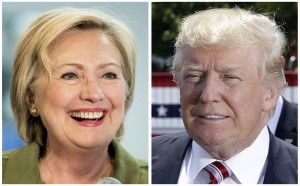
Hillary Clinton and Donald Trump (Photo credit: AP)
As polls opened on Election Day 2016, conventional election-forecasting models based on public opinion polling were unanimous in predicting a decisive victory for Democratic presidential candidate Hillary Clinton in the Electoral College — generally more than 300 electoral votes and a better than 70 percent probability of winning the election.
That is at variance with the Personal Electability Index (PEI) developed at the Unit for the Study of Personality in Politics, which has accurately predicted the outcome of every presidential election since 1996, before Super Tuesday — 8 months prior to the presidential election.
The PEI heuristic model employs candidate personality traits, as publicly perceived, to predict which contender will resonate most favorably with independent and unaffiliated voters who base their voting choice primarily on the candidate’s personal qualities as publicly displayed rather than on party-political affiliation or allegiance.
Based on those criteria, here are the PEI projections for Hillary Clinton and Donald Trump formally released on February 29, 2016:
Donald Trump (PEI = 62; 45 corrected score)
Hillary Clinton (PEI = 39; 29 corrected score)
The PEI model’s predictive utility in recent presidential election cycles appears to derive from the practically even division of the nation into reliably Republican and Democratic voting blocks, essentially yielding the balance of power to politically independent and unaffiliated voters comprising as much as one-third of the electorate.
The PEI model assumes that candidates have been vetted by means of prior election to high-level public office and that they have the near-unanimous support of their political base and party establishment, so Trump’s candidacy violates the model’s fundamental assumptions. Consequently, the PEI may not be sufficiently robust to weather Trump’s unconventional candidacy.
November 9, 2016 update: Turns out the Personal Electability Index is sufficiently robust.
Summary of conventional election-outcome projections as polls opened on Election Day
New York Times (‘The Upshot’)
Princeton Election Consortium (Sam Wang)
Rothenburg & Gonzales Political Report
FiveThirtyEight (Nate Silver)
November 4, 2016
Detailed psychological profiles of Hillary Clinton and Donald Trump released
The Unit for the Study of Personality in Politics has released political-psychological assessments of Hillary Clinton and Donald Trump.
Executive Summary: Hillary Clinton
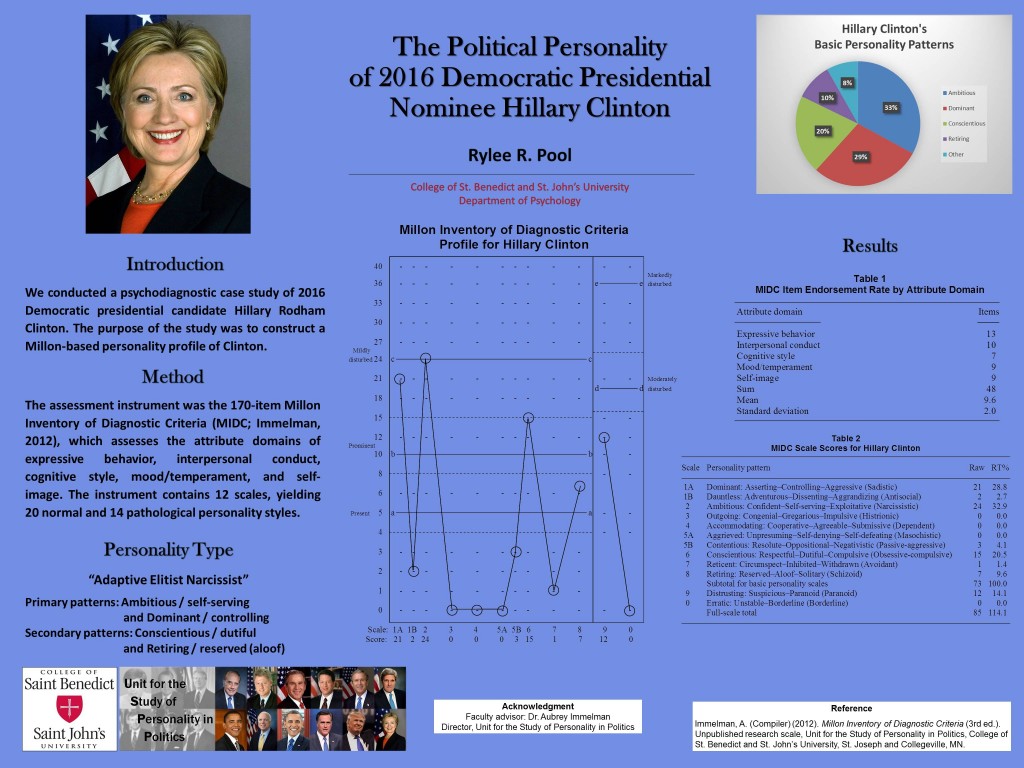
Click on image for larger view
Full text (34 pages)
The Political Personality of 2016 Democratic Presidential Nominee Hillary Clinton (Working paper, Unit for the Study of Personality in Politics, St. John’s University/College of St. Benedict, October 2016)
Executive Summary: Donald J. Trump
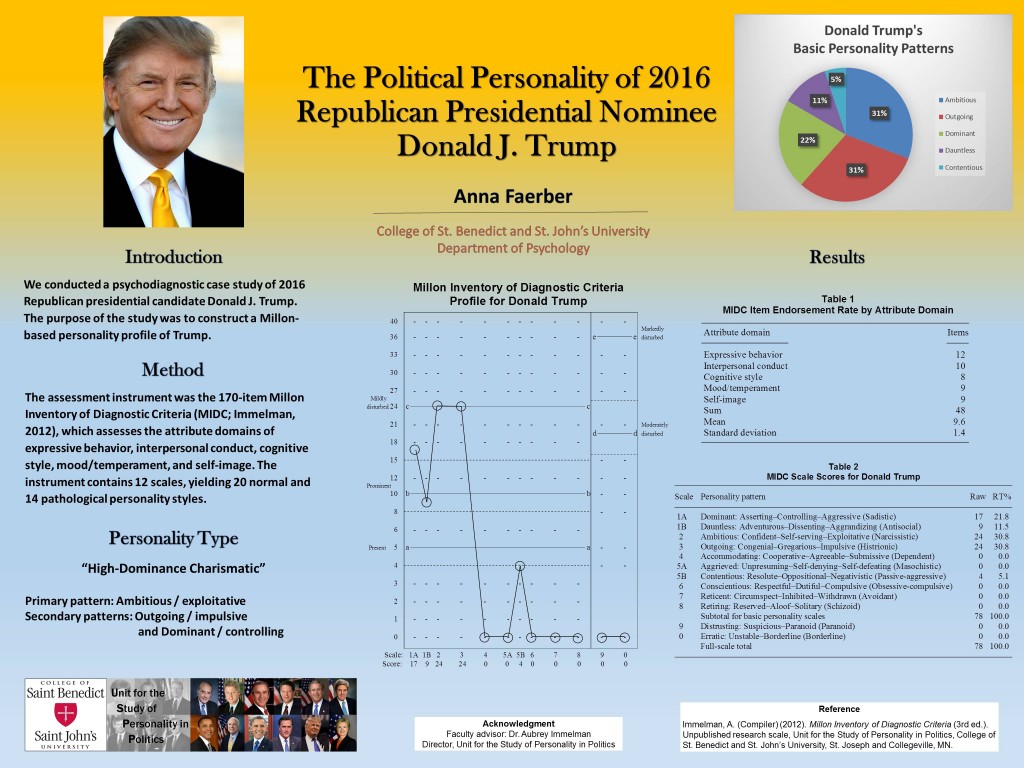
Click on image for larger view
Full text (31 pages)
The Political Personality of 2016 Republican Presidential Nominee Donald J. Trump (Working paper, Unit for the Study of Personality in Politics, St. John’s University/College of St. Benedict, October 2016)
Comparison of the Personalities of Hillary Clinton and Donald Trump
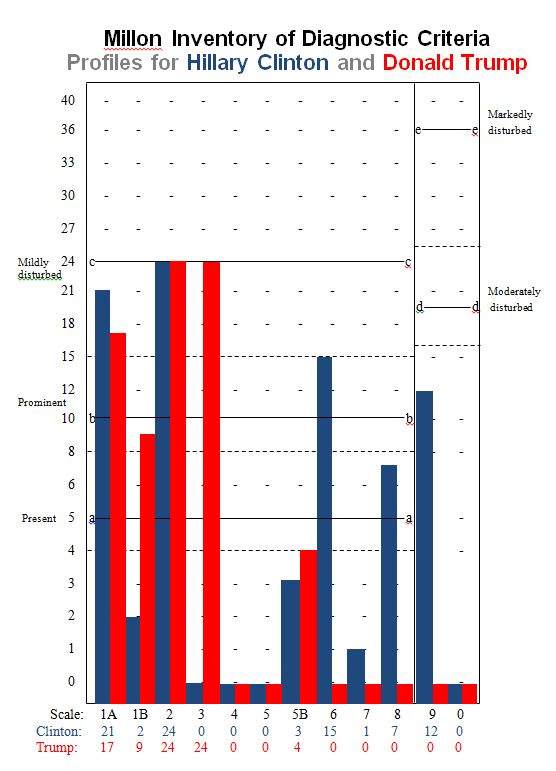
October 8, 2016
Why Donald Trump will not step down: Personality nearly identical to Bill Clinton’s
The fallout from the 2005 Access Hollywood video published by the Washington Post Friday showing Donald Trump making crude sexual remarks and bragging in obscene language about sexually forcing himself on women, has plunged the Republican Party into “an epic and historic political crisis” as a growing number of prominent Republicans call on Trump to drop out of the race (“GOP consumed by crisis as more Republicans call on Trump to quit race” by Jenna Johnson and Robert Costa, Washington Post, Oct. 8, 2016).
In this video from 2005, Donald Trump prepares for an appearance on ‘Days of Our Lives’ with Access Hollywood host Billy Bush and actress Arianne Zucker. (Obtained by The Washington Post)
Trump, who offered “a qualified apology for the remarks” in a video statement, reportedly told the Post “he would not drop out under any circumstances.”
The media and establishment want me out of the race so badly – I WILL NEVER DROP OUT OF THE RACE, WILL NEVER LET MY SUPPORTERS DOWN! #MAGA
— Donald J. Trump (@realDonaldTrump) October 8, 2016
That is fully consistent with Trump’s personality profile, which for practical purposes is nearly identical (see figure below) to that of Bill Clinton, who was similarly defiant throughout his 1998-99 impeachment saga.
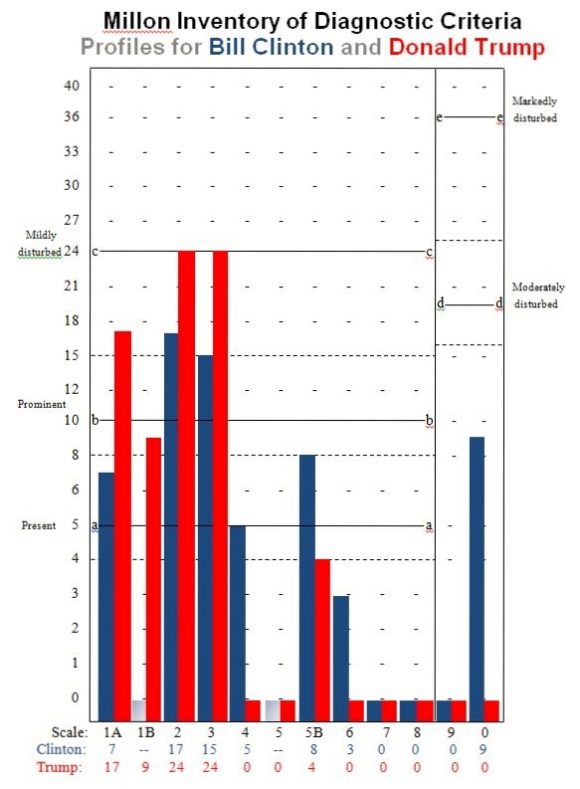
The major distinctions between Clinton’s and Trump’s profiles are that Trump is more dominant (aggressive, combative) than Clinton, who is more conflict averse (MIDC scale 1A: Trump = 17; Clinton = 7) and that Clinton is more accommodating than Trump, who is less agreeable (MIDC scale 4: Clinton = 5; Trump = 0).
The key similarity between Trump and Clinton is their primary scale elevations on MIDC scales 2 and 3. Scale 2 (“Ambition”) is a measure of narcissism (Trump = 24, Clinton = 17) and Scale 2 (“Outgoing”) is a measure of impulsive, histrionic tendencies (Trump = 24, Clinton = 15).
The “amorous narcissism” of Bill Clinton and Donald Trump
According to psychologist Theodore Millon, Ph.D., a leading expert on personality and its disorders, the “distinctive feature” of the Ambitious-Outgoing personality composite, which he labeled the amorous narcissist, is an “erotic and seductive orientation” (Millon, 1996, p. 410).
For these personalities, sexual prowess serves to enhance self-worth: “It is the act of exhibitionistically being seductive, and hence gaining in narcissistic stature, that compels,” according to Millon — who adds that, because of their “indifferent conscience” and the pressing need to nourish their “overinflated self-image,” these individuals may “fabricate stories that enhance their worth” (Millon, 1996, p. 411).
Digging through the archives: Bill Clinton’s sexual misconduct and defiance redux
In the wake of the “Access Hollywood” firestorm, I revisited my “Clinton Chronicle” in the archives of the Unit for the Study of Personality in Politics to review my commentary, analysis, and prognostications regarding Bill Clinton, which in my opinion provide a predictive model for how Trump will handle the crisis.
This is what I found:
Do President Clinton’s “Sexual Dalliances” Feed His Male Ego?
By Aubrey Immelman
Sept. 27, 1998 — Tonight, on Fox News Channel’s “This Evening with Judith Regan,” psychologist Judy Kuriansky suggested that the kind of sexual dalliances in which President Clinton reputedly engaged with Monica Lewinsky “feeds a man’s ego.” Though I would not go so far as to cast all men in that mold, there is certainly theoretical support for Dr. Kuriansky’s contention with respect to some personality types – most notably the “amorous narcissist,” whose personality pattern is dominated by narcissistic and histrionic traits.
According to the literature on personality disorders, the “distinctive feature” of amorous narcissists is “an erotic and seductive orientation” (Millon, 1996, p. 410). For these personalities, sexual prowess serves to enhance self-worth; “it is the act of exhibitionistically being seductive, and hence gaining in narcissistic stature, that compels” (or “feeds a man’s ego,” to use Dr. Kuriansky’s turn of phrase). …
Virtually all indicators in Bill Clinton’s personality profile point to a will to fight impeachment and removal to the bitter end. …
Why Bill Clinton Will Not Resign
By Aubrey Immelman
Oct. 9, 1998 — Over the past two months I have been intrigued by the mounting tally of newspapers calling on President Clinton to resign. Not surprisingly, in view of his personality profile, Mr. Clinton is unfazed by those appeals. So certain are some commentators that the president will be unable to prevail that they have all but adopted the mindset of a compulsive gambler on a losing streak who steadfastly believes that his next wager will hit the jackpot.
With reference to the president’s fortunes in the face of revelations and accusations that stick to the president with all the tenacity of water on the back of a duck, Fox News Channel’s Bill O’Reilly, for example, has repetitively expressed the view, “One more thing, and he’s gone.” Perhaps O’Reilly’s unyielding faith in the improbable says more about himself – by all appearances a highly moralistic person with a well-developed sense of decency – than about Bill Clinton, whose inner experience of shame is vastly different.
In situations that would ordinarily elicit shame or humiliation, personalities such as Bill Clinton initially try to screen out negative and judgmental reactions through rationalization and denial, devising plausible “proofs” or alibis to present themselves in the best possible light to salvage their deflated self-esteem. When that fails, these personalities typically become defiant and, if necessary, unleash their self-bolstering rage. Reluctant contrition appears very late in their repertoire, when their confidence is shaken, and even then their experience of remorse or shame is but momentary.
President Clinton has the ability to be unperturbed by circumstances that would prompt most people to hang their head in shame. For that reason, I believe Mr. Clinton is unlikely to resign, unless so pressured by his party that his position becomes utterly untenable. But ultimately, there is no need even for a personality profile to understand why Bill Clinton is practically incapable of resignation: given his obsession with his legacy, it is inconceivable that Bill Clinton would meekly join the ranks of Richard Nixon in the history books as the only president to have resigned from office.
In conclusion, the only plausible scenario in which Donald Trump drops out of the race is if the Republican Party and its electorate abandon their support for Trump in toto.
References
Millon, T. (1996). Disorders of Personality: DSM-IV and Beyond (2nd ed.). New York: Wiley.
October 5, 2016
Donald Trump’s temperament: Is he fit for office as president?
Donald Trump’s temperament has emerged as a major campaign issue in the 2016 U.S. presidential election.
Item: According to a Fox News poll conducted after the first presidential debate (Sept. 26), 59 percent of respondents felt Trump lacked the temperament to serve effectively as president, compared with 67 percent saying Clinton had the right temperament. (“Fox News poll: Clinton ahead of Trump after debate, fear motivating both sides” by Dana Blanton, FoxNews.com, Sept. 30, 2016)
Item: “By about two-to-one, voters say that their recent conversations about the election have been more about the candidates’ personalities and comments (59%) than about specific issues or policy positions (32%),” according to a Pew Research Center survey conducted June 7-July 5, 2016. (“Few Clinton or Trump supporters have close friends in the other camp” by Pew Research Center, August 3, 2016)
Item: “Most voters consider Donald J. Trump a risky choice for president, saying he lacks the right temperament and values,” with Hillary Clinton seen as a safer option, according to a Sept. 13-16 New York Times/CBS News poll. (“Voters’ view of a Donald Trump presidency: Big risks and rewards” by Patrick Healy and Dalia Sussman, Sept. 15, 2016)
Of course, it’s unlikely most poll respondents have an accurate understanding of the technical meaning of the term temperament. Considering the frequency with which the word is pronounced “temperment,” it’s likely many, if not most, voters understand temperament to refer primarily to a person’s temper – in other words, being irritable and prone to outbursts of anger (i.e., how easily someone flies off the handle), as opposed to having a calm, patient disposition.
The real meaning of temperament
Technically, temperament refers to behaviors linked with emotionality (positive vs. negative affect, the optimism–pessimism dimension) and arousability (passivity vs. activity, a low–high-energy dimension). Moreover, temperament emerges very early in life and is likely to have a heritable (inborn) basis.
A simplified explanation, paraphrasing psychologist Theodore Millon, would be that temperament refers to a person’s typical manner of displaying emotion and the predominant character of an individual’s affect (i.e., emotion), and the intensity and frequency with which he or she expresses it.
In practical terms, temperament shares much in common with the notion of “emotional intelligence,” which refers to the ability to recognize and understand one’s own emotions, and those of others, and to manage one’s own emotions and influence those of others. This capacity for emotional awareness, empathy, and skillful interpersonal relationships is a critical ingredient of effective leadership.
Trump’s personality profile

Click on image for larger view
An empirical study of Trump conducted at the Unit for the Study of Personality in Politics between June 2015 and August 2016, revealed that Trump’s predominant personality patterns are Outgoing/impulsive and Ambitious/exploitative (a measure of narcissism), infused with secondary features of the Dominant/controlling pattern.
Following is an outline of temperamental features of the personality patterns most centrally involved in driving Trump’s political behavior, based on Millon’s (1996) model of personality.
Outgoing (histrionic) pattern: Poor impulse control
Temperamentally, outgoing individuals are emotionally expressive; they are animated, uninhibited, and affectively (emotionally) responsive. Their moods can change quickly, with occasional displays of short‑lived and superficial moods. From a political leadership perspective, the attendant risk is that highly outgoing personalities are predisposed to impulsive actions; they may be over-excitable, capricious, and exhibit a pervasive tendency to be easily enthused and as easily bored or angered, leading to thoughtless, imprudent judgments and rash, even reckless courses of action.
Ambitious (narcissistic) pattern: Knee-jerk response to criticism
Temperamentally, narcissistic individuals are socially poised; at their best they are self-confident, optimistic, and cool and levelheaded under pressure. Though appearing carefree; nonchalant, and debonair, their blind spot is to respond reflexively to personal criticism with annoyance, rage, or anger.
Dominant (aggressive) pattern: Lacking in empathy
Temperamentally, dominant individuals are irritable; they have an excitable temper that they may at times find difficult to control. They tend to be lacking in empathy and are disinclined to experience and express warm feelings, complemented by a volatile temper that flares readily into contentious argument.
Political implications
Regarding the relationship between temper (narrowly defined as one component of temperament) and leadership, political scientist Stanley Renshon, in his 1996 book The Psychological Assessment of Presidential Candidates, asserted that its political implications hinges on five critical questions.
- Are the temper outbursts occasional or regular?
- Are there particular issues that set off the displays of temper?
- Does the candidate easily recover from angry episodes, or does he nurse grudges?
- Does the candidate berate or belittle those unlikely or unable to retaliate?
- Is the candidate aware of, and does he try to control his temper?
To the extent that outbursts of temper (1) occur regularly; (2) are set off by a broad range of issues; (3) prompt grudges that the candidate cannot let go of; (4) are directed at individuals unlikely or unable to retaliate; and (5) are poorly controlled by a candidate who appears to lack insight, the determination may be made that the candidate is unfit to govern.
Trump’s temperament, beyond its less admirable aspects, also embodies passion and straight-shooting candor. But whatever the deeper meaning and political implications of an unruly temper – character, personality, and temperament are legitimate public issues in determining a presidential candidate’s fitness to lead.
References
Millon, T. (1996). Disorders of Personality: DSM–IV and Beyond (2nd ed.). New York: Wiley.
Renshon, S. A. (1996). The Psychological Assessment of Presidential Candidates. New York: New York University Press.
September 30, 2016
Why Donald Trump can’t let go of Alicia Machado
Four days after the debate, why can’t Donald Trump let go of the decades-old former Miss Universe, Alicia Machado, imbroglio — especially when it can only hurt him with the key suburban women demographic?
Short answer: Narcissistic leaders display grandiosity, are vulnerable to criticism, and lack empathy. In response to personal slights, they are prone to lash out vindictively against their critics and blame others for their own failures (see “Why tyrants go too far: Malignant narcissism and absolute power” by political scientist Betty Glad in Political Psychology, vol. 23, no. 1 [March 2002], pp. 1-37).
![]() Video » Trump goes on a Friday tweet storm (MSNBC “Morning Joe,” Sept. 30, 2016) — Up early, Donald Trump took to Twitter on Friday to rail against both Hillary Clinton and Alicia Machado. (14:11)
Video » Trump goes on a Friday tweet storm (MSNBC “Morning Joe,” Sept. 30, 2016) — Up early, Donald Trump took to Twitter on Friday to rail against both Hillary Clinton and Alicia Machado. (14:11)
![]() Video » Mika: Trump telling women he determines beauty (MSNBC “Morning Joe,” Sept. 30, 2016) — Mika Brzezinski weighs in on this week’s controversy involving former Miss Universe Alicia Machado and Donald Trump’s remarks about her weight. (5:15)
Video » Mika: Trump telling women he determines beauty (MSNBC “Morning Joe,” Sept. 30, 2016) — Mika Brzezinski weighs in on this week’s controversy involving former Miss Universe Alicia Machado and Donald Trump’s remarks about her weight. (5:15)
September 26, 2016 [Updated September 27, 2016]
See scorecard in gray-blue font embedded in the debate preview
Preview: Who will win the Clinton-Trump presidential debate?
Tonight, Democratic front-runner Hillary Clinton will face off against Republican challenger Donald Trump in the first presidential debate of the 2016 election cycle at Hofstra University in New York, in front of an anticipated record-setting 100 million television viewers.
As is customary in presidential debates, analysts and commentators likely will pick a winner and a loser. But while the political pundits attach inordinate value to rational considerations such as the candidates’ command of policy details, the judgment of the average viewer tends to be far more impressionistic, driven by perceptions of the candidates’ personal qualities.
The American National Election Studies (ANES) identified four facets of voter evaluation with respect to presidential character traits – competence, leadership, integrity, and empathy – and since 1984 have asked respondents to rank presidential candidates on those traits.
According to political psychologist Donald Kinder, voters initially screen presidential candidates on the “statesmanlike” traits of competence, leadership, and integrity, and once the statecraft issue is settled look for empathy (warmth and compassion).


Click on images for larger view
So, how to the contenders stack up on presidential mettle, based on political experience and their personal psychology?
First base: Competence
Clinton has a demonstrable track record of competence in the political arena, though Trump has actively undermined Clinton’s reputation by defining her as an abject failure in foreign policy. However, in the personal department, Clinton outscores Trump on the Millon Inventory of Diagnostic Criteria’s (MIDC) Conscientiousness scale (Clinton = 15; Trump = 0), a psychological measure of competence.
Score strong advantage Clinton.
Scorecard
As expected, Trump hammered Clinton on trade- and foreign policy failures; however, Clinton retained her composure and was largely successful in fending off Trump’s attacks.
Also as anticipated, Clinton displayed superior debate preparation and ability to stay on-message, whereas Trump became increasingly undisciplined and unfocused towards the end of the debate.
Base hit Clinton.
Second base: Leadership
As a former United States senator and secretary of state, Clinton undeniably has more experience in the realm of political leadership, though Trump has touted his own success as a business leader. Psychologically, Clinton has a very slight edge over Trump on the MIDC’s Dominance scale (Clinton = 21; Trump = 17), a quality that voters typically perceive as reflecting strong leadership.
Score slight advantage Clinton.
Scorecard
Clinton not only displayed her political leadership experience but succeeded to a significant degree in undermining Trump’s reputation as a successful business leader. Trump scored points in noting that if Clinton hadn’t been able to fix America’s problems in her long political career thus far, there was no plausible reason to believe she would suddenly start now.
Clinton dominated the latter part of the debate, often forcing Trump to play defense.
Base run Clinton.
Third base: Integrity
It can be said with little risk of hyperbole that both candidates appear ethically challenged. The most reliable MIDC indices of integrity are low scores on the scales of Ambition (a measure of narcissism) and Dauntlessness (risk-taking). Clinton and Trump have identically elevated scores of 24 on the narcissism measure, but Clinton is the clear winner on risk aversion (Clinton = 2; Trump = 9). It is noteworthy, however, that Trump has been more successful on the campaign trail in framing “Crooked Hillary” as being dishonest.
Score slight advantage Clinton.
Scorecard
Clinton was more effective calling into question Trump’s business dealings than Trump was in highlighting Clinton’s ethical lapses and negligence with respect to her private email server. In part, that was due to Trump lacking the discipline to follow through on the email issue and apparently being unprepared to mount an effective attack on Clinton regarding the FBI probe of the email issue.
Missed opportunity Trump; Clinton steals third.
Bringing it home: Empathy
Based on their respective MIDC scores, neither Clinton nor Trump can be characterized as compassionate; however, Trump has the requisite personality traits to project a warm, empathic political persona.
The most direct MIDC measure of empathy is the Accommodating scale, a measure of likableness on which both Clinton and Trump flatline with a score of zero. However, Clinton is no match for Trump in the ability to project empathy. Specifically, Trump outscores Clinton 24 to zero on the MIDC Outgoing scale, a measure of extraversion, energy, and social intelligence – the so-called “beer test” of likability.
Huge advantage Trump.
Scorecard
Trump clearly attempted to conjure up a more compassionate persona; however, he was too easily baited by Clinton and at times allowed her to get under his skin. In addition, he responded to a question on race relations with an argument about law and order. Clinton, purely by dint of superior debate preparation, discipline, and remaining measured and composed — emotional intelligence — successfully prevented Trump from presenting himself as the more likable candidate.
Unforced error Trump; Clinton scores run.
The final score
Clinton will step onto the stage with a clear advantage on “statesmanship” traits of perceived competence and leadership, which gets her to first base. If she can maintain her edge in this veritable “World Series” of presidential politics by demonstrating a superior grasp of policy details and fitness to lead, it should be good enough to get her to second.
Scorecard: Clinton on second.
But from here on it only gets harder for Hillary. The debate moderator can retire Clinton with a force out on a “gotcha” question regarding her honesty, or Trump can tag her out with a rhetorical counterpunch on the character issue.
Scorecard: No “gotcha” question (or follow-ups) from the debate moderator; Trump unprepared to follow through on the email issue; Clinton steals third.
Assuming Clinton manages to steal third, thereby clearing the statecraft hurdle, it’s hard to imagine any scenario in which she can overcome the final psychological barrier to scoring the winning run by presenting herself as warm and likable.
Scorecard: Turns out Clinton did not have to present herself as warm and likable. By merely being well prepared, maintaining message discipline, and retaining her composure, Clinton edged out Trump. Clinton scores.
For Clinton to win, Trump would have to disqualify himself on the grounds of fitness to govern and presidential temperament, thus forfeiting the game.
Scorecard: Trump was generally successful in restraining his volatile temperament and thus did not disqualify himself on the grounds of fitness to lead; however, consistent with his personality profile, he was inadequately prepared and too undisciplined. Trump forfeits Game 1 in the series.
By the same token, if Clinton has another coughing fit or fainting spell, it could be game over in a series-ending strikeout.
Scorecard: No evidence of health issues on Clinton’s part; in fact, Trump was the one who seemed more fatigued by the end of the debate.
September 14, 2016
Why Donald Trump doesn’t want moderators at the presidential debates
In a recent interview on CNBC’s “Squawk Box” Donald Trump said, “I think we should have a debate with no moderator, just Hillary and I sitting there talking.” (Trump challenges Clinton to debate without a moderator, Matthew J. Belvedere, CNBC, Sept. 12, 2016)
Why would that be?
From the perspective of the psychology of politics, the obvious explanation is that Machiavellians like Trump thrive in unstructured or ambiguous situations.
The Machiavellian political type, according to Richard Christie & Florence Geis (Studies in Machiavellianism, 1970), is a person who delights in manipulating other people’s feelings and behavior, but whose own behavior in emotion-arousing situations is cool and rational.
According to research by Christie and Geis, high “Machs” thrive in face-to-face interactions because of their ability to remain emotionally detached in highly charged, stressful situations. This is especially true in unstructured or loosely structured situations that offer broad latitude for improvisation (such as an unmoderated debate), which allows them to distract adversaries and throw them off script while remaining cool, calm, and collected.
August 31, 2016
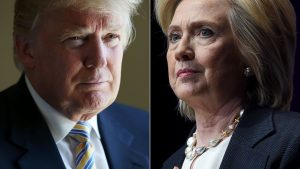
Getty Images
The New York Times (Aug. 29, 2016) reports:
Hillary Clinton’s advisers are talking to Donald J. Trump’s ghostwriter of “The Art of the Deal,” seeking insights about Mr. Trump’s deepest insecurities as they devise strategies to needle and undermine him in four weeks at the first presidential debate, the most anticipated in a generation.
Her team is also getting advice from psychology experts to help create a personality profile of Mr. Trump to gauge how he may respond to attacks and deal with a woman as his sole adversary on the debate stage.
Such a psychological profile, available elsewhere on this site, already exists.

Click on image for larger view
Based on that profile, an effective way to “bait” Trump into “making blunders” and to “get under his skin” and “provoke him to rant and rave” (to use the language contained in the Times report), is to attack his reputation (high MIDC scales 2 and 1A, in that order).
As stated in the Times, “The Clinton camp believes that Mr. Trump is most insecure about his intelligence, his net worth and his image as a successful businessman.” Hitting Trump on those points would be a good start to a winning edge in the debate.
Trump’s debate prep sessions the past two weekends, according to the Times, “were more freewheeling than focused,” and Trump could “barely conceal his disdain for laborious and theatrical practice sessions.”
That is consistent with Trump’s personality profile (high MIDC scale 3 and low scale 6).
Art of the Deal co-author Tony Schwartz, who is advising the Clinton campaign, is essentially correct in his assessment, as reported by the Times:
“Trump has severe attention problems and simply cannot take in complex information — he will be unable to practice for these debates,” said Mr. Schwartz, who was the subject of a New Yorker profile last month that portrayed Mr. Trump as a charlatan.
For Clinton (or the debate moderators) to rattle Trump, the requisite strategy would be to press him to stay on topic and provide specifics.
As for Hillary Clinton, she is by nature highly rehearsed, scripted, and programmed (consistent with her elevated score on MIDC scale 6).
For Trump to outmaneuver Clinton, the requisite strategy would be to disrupt her planning and preparation by taking the debate off topic and to press her on topics for which she may not be well prepared. Trump ranks high on Machiavellianism, meaning he thrives in unstructured situations and is quick to identify vulnerabilities; anything he does to disrupt the predictability of the debate will give him the upper hand over Clinton.
In addition, Trump is correct in his assessment, as reported by the Times, “that he can box in Mrs. Clinton on her ethics and honesty.” Consistent with her personality profile (elevated MIDC scale 6), Clinton is likely to value aspects of herself that exhibit virtue, moral rectitude, and prudence, and to be fearful of error or misjudgment. Clinton’s glass jaw would be getting hammered repeatedly on those points in personal attacks.
Related reports
Psychological profile of Donald Trump
Psychological profile of Hillary Clinton
Inside debate prep: Clinton’s careful case vs. Trump’s ‘WrestleMania’
(Philip Rucker, Robert Costa, and Anne Gearan, Washington Post, Aug. 27, 2016)
August 23, 2016
Why personality matters in media coverage of presidential campaigns
Susan Page, writing in USA TODAY (“Let Trump be Trump. There’s no other option,” Aug. 22, 2016), makes an important point regarding the importance of studying personality in politics and making character a centerpiece in presidential campaign coverage — as revealed in the excerpts below:
Let’s stipulate that campaigns are too long, too driven by the occasional misstep and too little focused on the policies the prospective presidents would pursue in office. But, as I cover my 10th campaign, I’d argue that the length and scrutiny of campaigns also give voters a glimpse into some of the qualities that matter most in the leader they’ll entrust with their country. …
The online surveys that match voters with the candidate they most closely align with on specific issue positions miss the point. Ideology matters, of course, but in many ways the presidential election is less policy-driven than those for other offices. …
At the moment, Trump and Clinton are proving the point. In political ads or on the stump, neither campaign is talking mostly about tax policy or a health care overhaul or NATO’s future. Instead, each is attacking the opponent as lacking the core qualities needed in a president. It’s about characteristics that come through regardless of any attempts at political plastic surgery during a campaign.
Does Hillary Clinton lack the mental and physical stamina to serve as president, as Trump asserts? …
Does Donald Trump lack the temperament and knowledge to trust him as president, as Clinton argues? …
Although candidates often try to slide a bit back to the political center after primary campaigns dominated by partisans of the right or left, they don’t suddenly become different people, with different personas.
Although candidates often try to slide a bit back to the political center after primary campaigns dominated by partisans of the right or left, they don’t suddenly become different people, with different personas.
Both candidates have well-known vulnerabilities on that measure. Trump has been full of bluster and bombast — deriding a Gold Star family, questioning the ability of a judge of Mexican heritage to be fair, ridiculing a disabled journalist. Meanwhile, Clinton has become enmeshed in self-inflicted controversies over her decision to exclusively use a private email server as secretary of State, and her failure to avoid the appearance of conflicts of interest involving donations to the Clinton Foundation from foreign governments and interests.
What will be decisive in this campaign isn’t a well-delivered speech on a teleprompter or a carefully calibrated position. It will be a fundamental assessment about the wisdom and character of a prospective president. Do we trust this person to handle the crisis that neither the candidate nor the voter knows is ahead?
Psychoanalytic definition of character:

August 12, 2016
Donald Trump makes an interesting point
I love watching these poor, pathetic people (pundits) on television working so hard and so seriously to try and figure me out. They can’t!
— Donald J. Trump (@realDonaldTrump) August 12, 2016
Related: Psychological Profile of Donald J. Trump
August 11, 2016
Donald Trump’s narcissism is not the main issue
On the psychology of politics, media attention of late has focused on Donald Trump’s narcissism (see “Amateurs analyze Trump’s mind, but should the pros do it?” by Seth Borenstein, Associated Press, Aug. 11, 2016). However, in the context of the 2016 U.S. presidential campaign, Trump’s narcissism is not the main issue; Donald Trump and his Democratic opponent, Hillary Clinton, have identical Millon Inventory of Diagnostic Criteria scores on narcissism (MIDC scale 2: Ambitious = 24).
A narcissistic personality can be socially and politically adaptive (functional, nonpathological) if complemented and balanced by appropriately congruent personality patterns, as in the case of Hillary Clinton — at least insofar as erratic, undisciplined political behavior is concerned.
The critical difference between the Republican and Democratic nominees is their score on extraversion (MIDC scale 3: Outgoing; Trump = 24, Clinton = 0), which at higher elevations — as in the case of Trump — may be tantamount to a histrionic personality disorder.
Trump’s high score on the MIDC Outgoing scale accounts for his impulsiveness and lack of discipline and self-restraint (frequently referred to in media commentary as “no filter”).
Trump’s impulsive tendency is exacerbated by his remarkably low score on conscientiousness (MIDC scale 6: Conscientious = 0). Clinton, in contrast, is substantially conscientious (MIDC scale 6: Conscientious = 15), which is associated with emotional restraint, self-discipline, and prudence.
Following personality theorist Theodore Millon, here’s a quick rundown of personality attributes associated with high elevations on the Outgoing pattern, which approaches histrionic levels in the case of Trump but fails to register on Clinton’s MIDC profile:
Expressive behavior: Dramatic/Impulsive — engaging, provocative, volatile; intolerant of inactivity, resulting in impulsive, highly emotional, and theatrical responsiveness.
Interpersonal conduct: Attention-seeking/Flamboyant — actively solicits attention and approval; vain and exhibitionistic, seeking to be the center of attention.
Cognitive style: Flighty/Scattered — avoids introspective thought, attentive to fleeting external events, and speaks in impressionistic generalities; integrates experiences poorly, resulting in scattered learning and thoughtless judgments.
Self-image: Gregarious/Charming — views self as sociable, stimulating, and charming; enjoys the image of attracting others by physical appearance and pursuing a busy and pleasure-oriented lifestyle.
Mood/temperament: Fickle/Impetuous — rapidly-shifting and shallow emotions; energetic, animated, hotheaded or impulsive, and exhibits a tendency to be easily enthused and as easily angered or bored.
Summary and formulation
To take the full measure of the man, political analysts must consider the interplay between Donald Trump’s ambitious (“narcissistic”) and outgoing (“histrionic”) tendencies, as described in the Millon Inventory of Diagnostic Criteria manual:
Persons who score high on both the Ambitious and Outgoing scales are clever and charming; they are skilled at attracting and seducing others. Though highly ambitious, Ambitious–Outgoing individuals also tend to be undisciplined, traveling an erratic course of successes, failures, and abandoned hopes. Needing excitement, stimulation, and challenge, they are easily bored by routine activities and often act impulsively. They exhibit a restless, driven quality, which may be accompanied by a deficit in social dependability. Because agreements are often hastily assumed, they may have trouble honoring their promises or meeting their obligations. Ultimately, they are more attuned to their own needs than to those of others.
Though fundamentally self-oriented, these individuals are facile in the ways of social seduction, often feign an air of dignity and confidence, and are skilled at deceiving others with their clever glibness. They fabricate stories to enhance their worth and leave behind a trail of broken promises and outrageous acts. Fabrication serves both to nourish their inflated self-image and to seduce others into supporting their excesses; however, their disregard for the truth and talents for exploitation and deception are rarely hostile or malicious in intent. Typically, it is simply a product of their narcissistic attitude of omnipotence and their profound sense of entitlement; fundamentally, they are not malevolent. Criticism, confrontation, and punishment are unlikely to make them change their ways and, in fact, may prompt dismissive rage or anger.
Related reports
The Personality Profile of Donald Trump (Aug. 9, 2015)

Click on image for larger view
The Personality Profile of Hillary Clinton (July 27, 2016)

Click on image for larger view
August 5, 2016
Hillary Clinton and Donald Trump rank equally high on narcissism
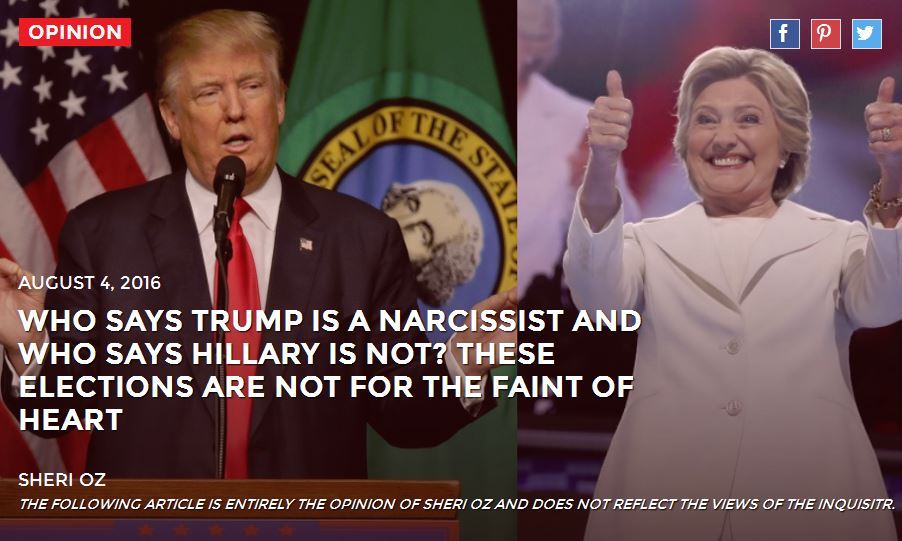 In 2008, and again this year, Hillary has been found to be narcissistic. Rylee Pool and Aubrey Immelman conducted a study of her personality at the Unit for the Study of Personality in Politics (USPP).
In 2008, and again this year, Hillary has been found to be narcissistic. Rylee Pool and Aubrey Immelman conducted a study of her personality at the Unit for the Study of Personality in Politics (USPP).
A psychological analysis of Hillary Clinton … revealed that Clinton’s predominant personality patterns are Ambitious/self-serving (a measure of narcissism) and Dominant/controlling, infused with secondary features of the Conscientious/dutiful and Retiring/reserved patterns. In summary, Clinton’s personality composite can be characterized as an adaptive elitist narcissist.
That doesn’t sound very good: adaptive elitist narcissist. What it means is that Hillary is extremely ambitious and controlling and has a sense of entitlement. She believes that she knows best and lacks empathy for others. However, the public is served, Immelman claims, because of “her embrace of humanitarian political issues as a vehicle for political expression.” That is, perhaps, her saving grace — the fact that she invests her narcissistic energies in pursuing causes that are commonly regarded as altruistic.
Now let us compare Hillary’s personality assessment with one conducted by Immelman and Hannah Hoppe on Donald Trump.
A psychological analysis of … Donald Trump … revealed that Trump’s predominant personality pattern is Ambitious/self-serving (a measure of narcissism) with secondary features of the Dominant/controlling and Outgoing/gregarious patterns. In summary, Trump’s personality composite can be characterized as a high-dominance charismatic.
The dominant elements, ambitious/narcissist and controlling, are similar for both Hillary and Trump. Hillary, however, is less of a people person, something her campaign advisors have apparently been trying to work on with her for these elections.
In some ways, Trump’s assessment parallels that of former President Bill Clinton, who is similarly socially skilled, driven, undisciplined, more attuned to his own needs than those of others. …
Read the full story at The Inquisitr News
August 2, 2016
Does Donald Trump have a personality disorder?
Dr. Drew Pinsky: Trump may be mentally ill
![]() Video » Dr. Drew talks Trump (“CNN Tonight,” Aug. 1, 2016) — Dr. Drew Pinsky tells Don Lemon that Donald Trump does not fit the stringent legal definition for insanity — but he does show signs of multiple mental illnesses. (6:46)
Video » Dr. Drew talks Trump (“CNN Tonight,” Aug. 1, 2016) — Dr. Drew Pinsky tells Don Lemon that Donald Trump does not fit the stringent legal definition for insanity — but he does show signs of multiple mental illnesses. (6:46)
‘Dr.’ Lawrence O’Donnell diagnoses Donald Trump with narcissistic personality disorder on MSNBC
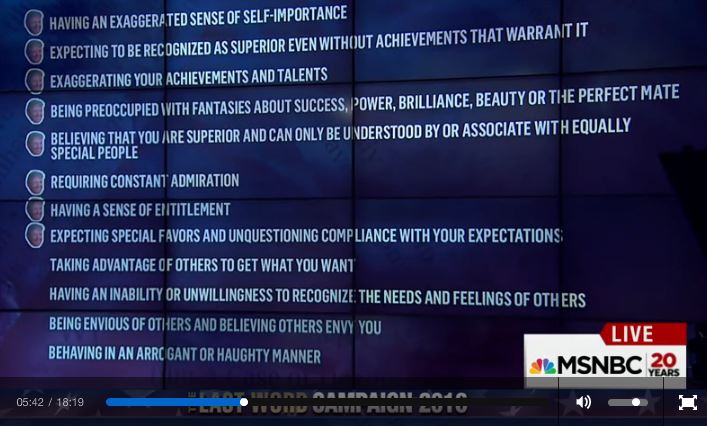
![]() Video » Trump: the candidate ‘unfit to serve?’ (MSNBC “The Last Word,” Aug. 2, 2016) — Pres. Obama blasted Donald Trump, calling the GOP nominee ‘unfit to serve’ as president. Lawrence O’Donnell speaks with George Simon, E.J. Dionne, and Mark Singer about Trump’s temperament, rhetoric, and personality challenges. (18:20)
Video » Trump: the candidate ‘unfit to serve?’ (MSNBC “The Last Word,” Aug. 2, 2016) — Pres. Obama blasted Donald Trump, calling the GOP nominee ‘unfit to serve’ as president. Lawrence O’Donnell speaks with George Simon, E.J. Dionne, and Mark Singer about Trump’s temperament, rhetoric, and personality challenges. (18:20)
Update
![]() Video » Assessing the fitness of presidential candidates: Time to ask a mental health professional? (MSNBC “Morning Joe,” Aug. 29, 2016) — Obama 2008 campaign manager David Plouffe claims on “Meet the Press” that Donald Trump “meets the clinical definition” of a “psychopath.” … Joe Scarborough and former DNC chairman Howard Dean cite the “Goldwater rule” and speculate whether Trump is a “psychopath” or a “sociopath.” (6:02)
Video » Assessing the fitness of presidential candidates: Time to ask a mental health professional? (MSNBC “Morning Joe,” Aug. 29, 2016) — Obama 2008 campaign manager David Plouffe claims on “Meet the Press” that Donald Trump “meets the clinical definition” of a “psychopath.” … Joe Scarborough and former DNC chairman Howard Dean cite the “Goldwater rule” and speculate whether Trump is a “psychopath” or a “sociopath.” (6:02)
July 30, 2016
At the start of the general election campaign immediately following the Republican and Democratic national conventions, the “smart money” 100 days before the 2016 presidential election is on Hillary Clinton to win in a landslide.
As Rachel Maddow reported July 29 on MSNBC, the Rothenburg Political Report, the Cook Political Report, Sabato’s Crystal Ball, and the Princeton Election Consortium all projected more than 300 Electoral College votes for Clinton (270 needed to win).
Moreover, New York Times ‘The Upshot,’ Nate Silver’s FiveThirtyEight, and PredictWise forecast, on average, a better than 60 percent chance of Clinton winning the election. [Aug. 3 update: The Upshot: 74%; FiveThirtyEight: 70%; PredictWise: 78%; Sam Wang: 80%]
Maddow’s discussion of the election-outcome predictions starts at 10:40 on the video segment below (“The Rachel Maddow Show,” July 29, 2016).
![]() Video
Video
In contrast to the conventional wisdom, my own presidential election forecast model, the Personal Electability Index (PEI), projected as early as August 2015 that Donald Trump would defeat Hillary Clinton.
The PEI, developed at the Unit for the Study of Personality in Politics (USPP), has accurately predicted, before Super Tuesday, the outcome of every presidential election since 1996.
The PEI heuristic model employs candidate personality traits, as publicly perceived, to predict which contender will resonate most favorably with independent and unaffiliated voters who base their voting choice primarily on the candidate’s personal qualities as publicly displayed rather than on party-political affiliation or allegiance.
Update
On August 8, 2016, the New York Times reported that “fifty of the nation’s most senior Republican national security officials … have signed a letter declaring that Donald J. Trump ‘lacks the character, values and experience’ to be president and ‘would put at risk our country’s national security and well-being,’ [concluding] ‘None of us will vote for Donald Trump.’ “
Then, on August 11, Politico reported that more than 70 Republicans signed an open letter to Republican National Committee Chairman Reince Priebus urging him to stop spending any money to help Donald Trump win in November and shift those contributions to Senate and House races.
Trump’s GOP Troubles (Smerconish, CNN, Aug. 13, 2016) — Trump campaign adviser and pollster Kellyanne Conway faces off with former congressman Tom Coleman who signed the anti-Trump letter sent to the RNC. (Duration: 07:58)
Commentary
The Personal Electability Index (PEI) model’s predictive utility derives from the practically even division of the nation into reliably Republican and Democratic voting blocks, essentially yielding the balance of power to politically independent and unaffiliated voters comprising as much as one-third of the electorate.
Stated differently, the model assumes that the vast majority (roughly 90%) of registered and self-identified Republicans will vote for the Republican nominee and a similar proportion of Democrats for the Democratic nominee.
Failure of the party to unite behind their nominee — as currently appears to be the case with the GOP — violates the core assumption of the model and invalidates its predictive utility.
More information about the Personal Electability Index
Related links

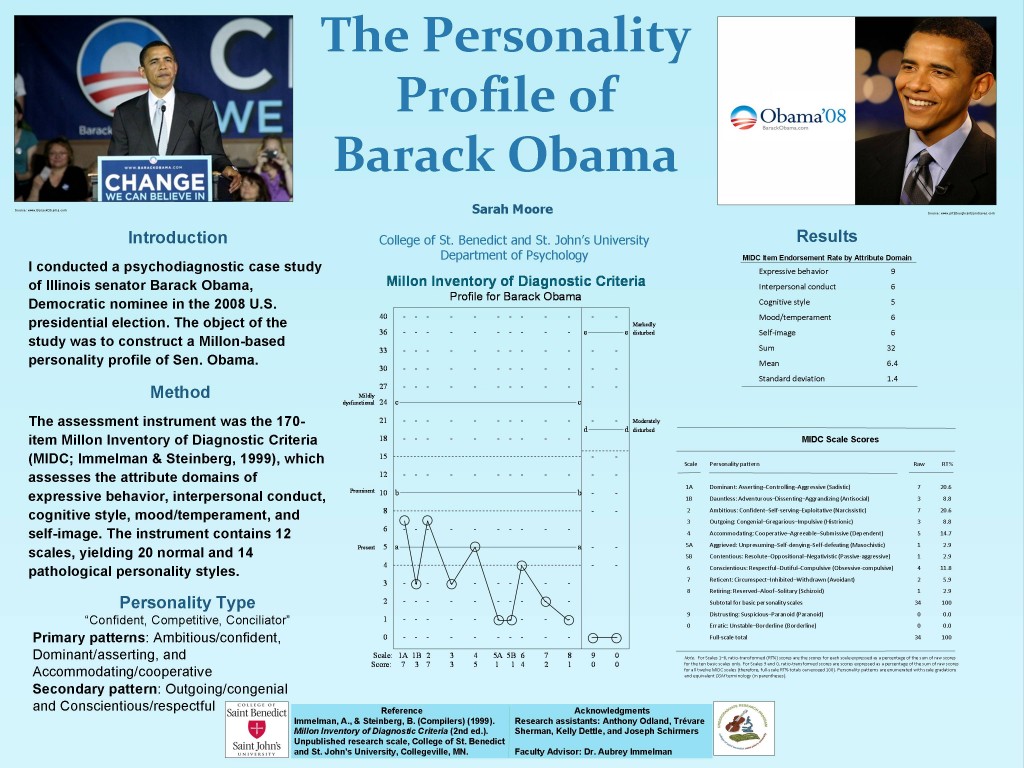
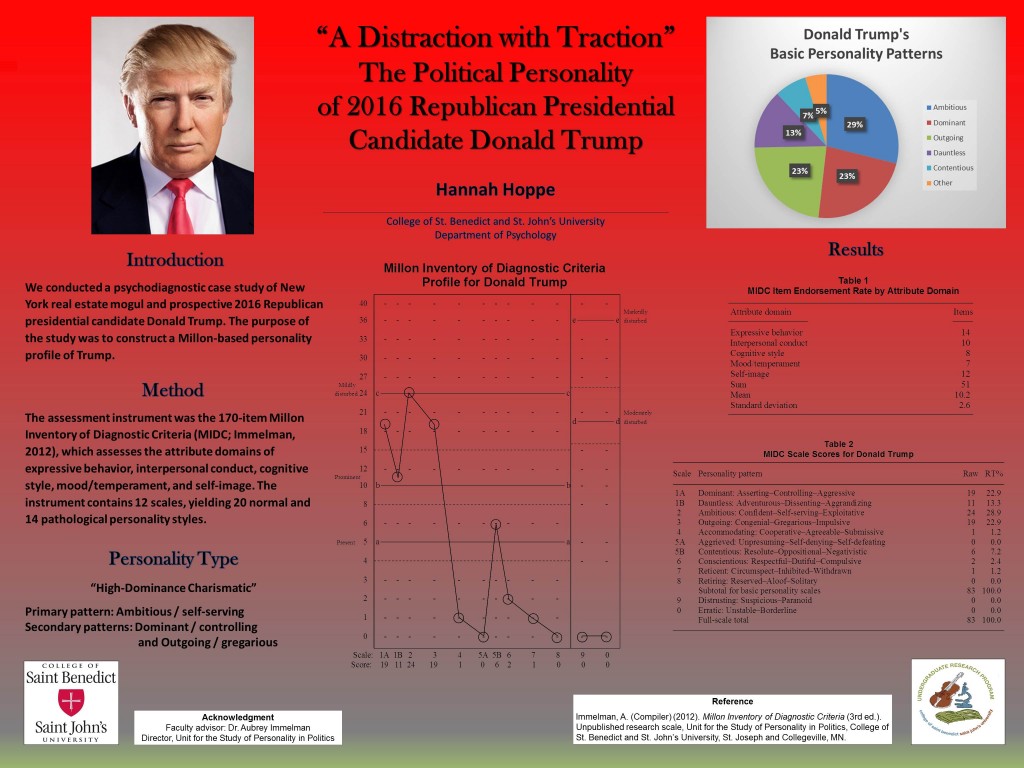
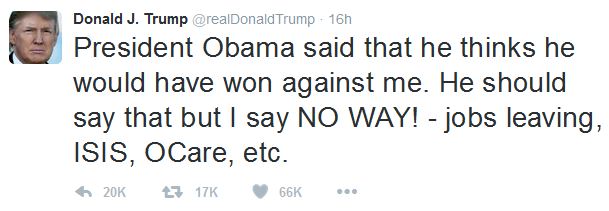
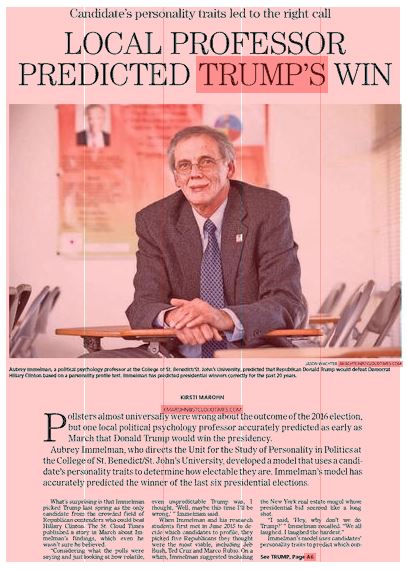
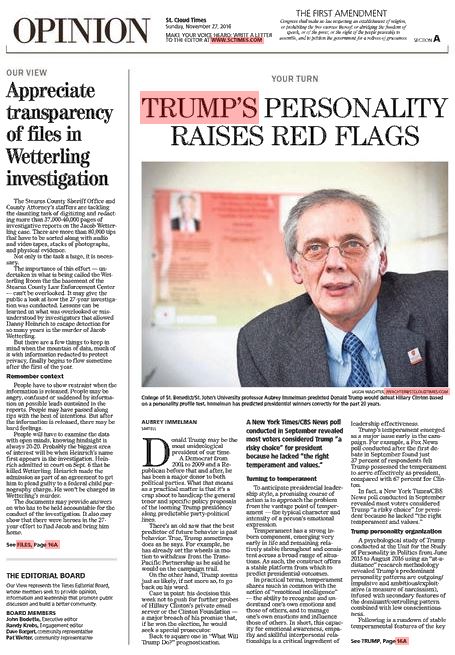

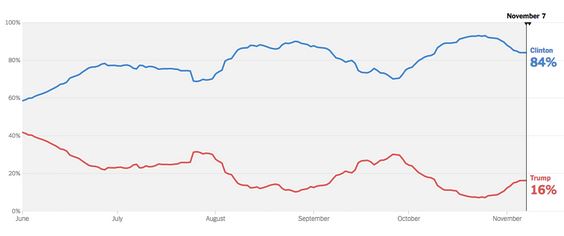
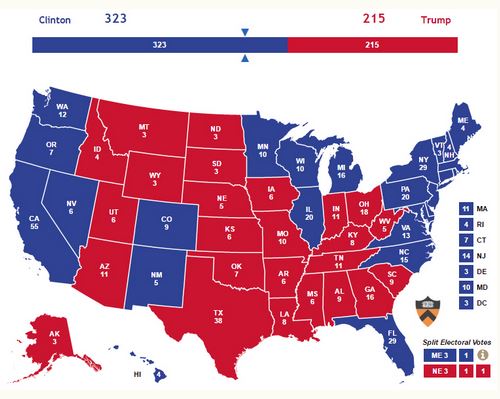

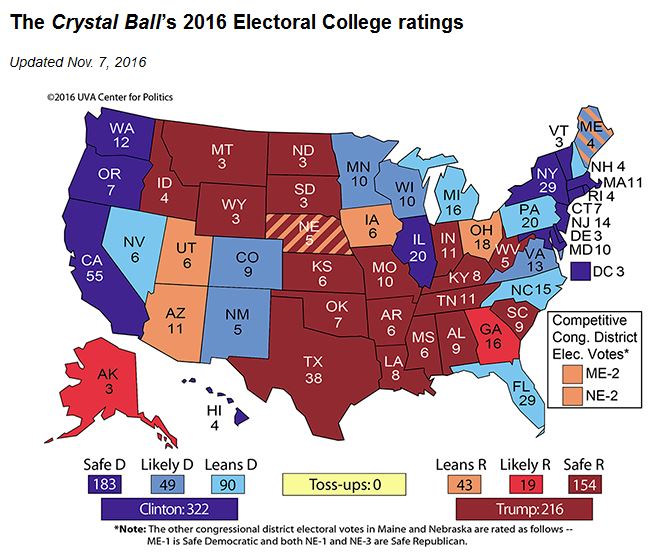
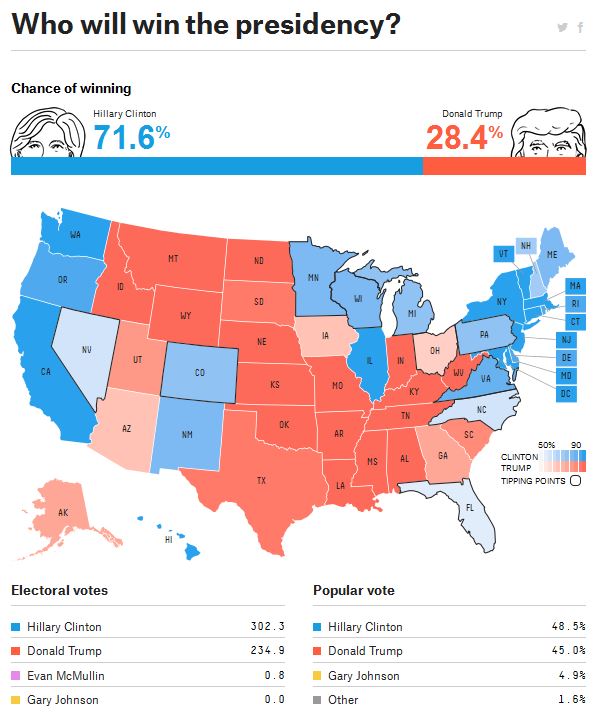
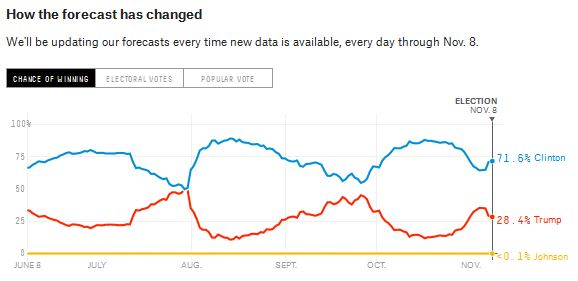
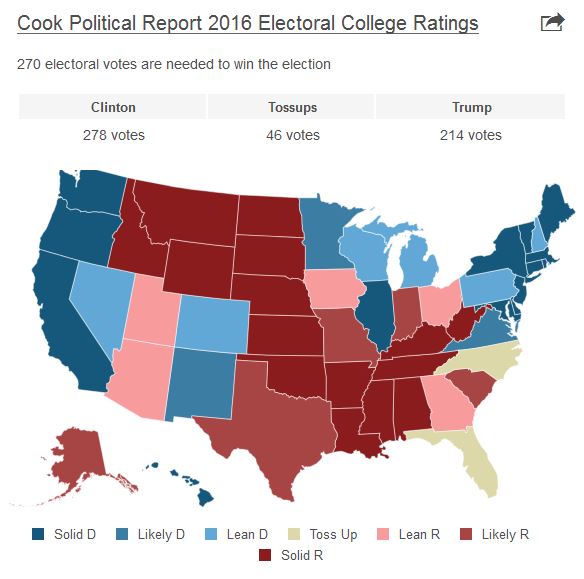
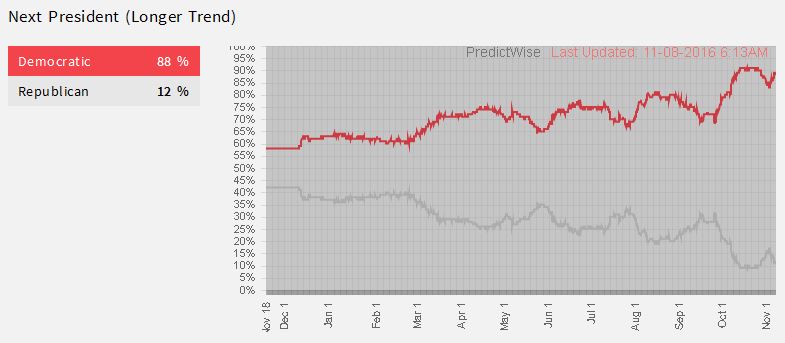
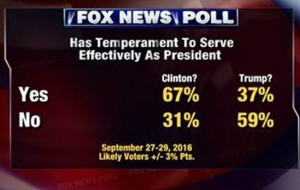
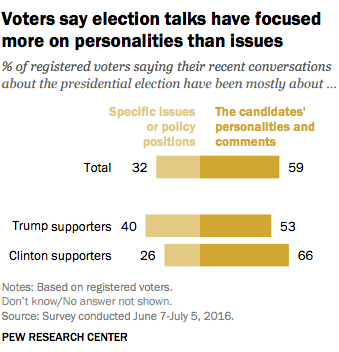
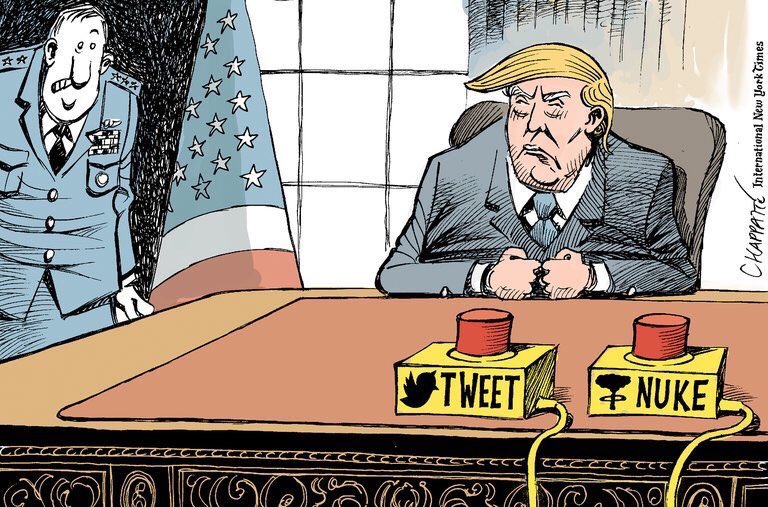
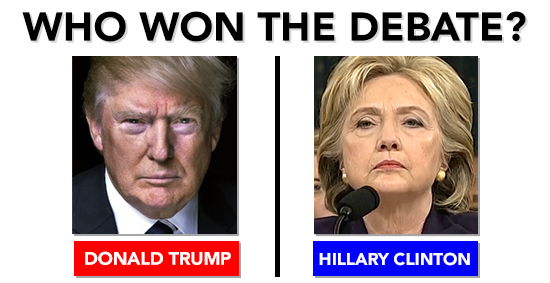
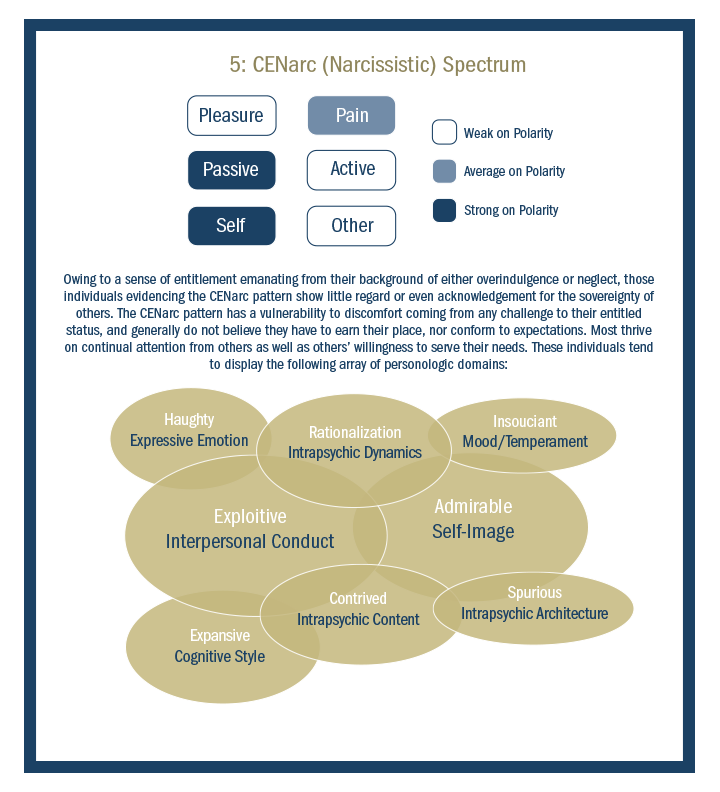
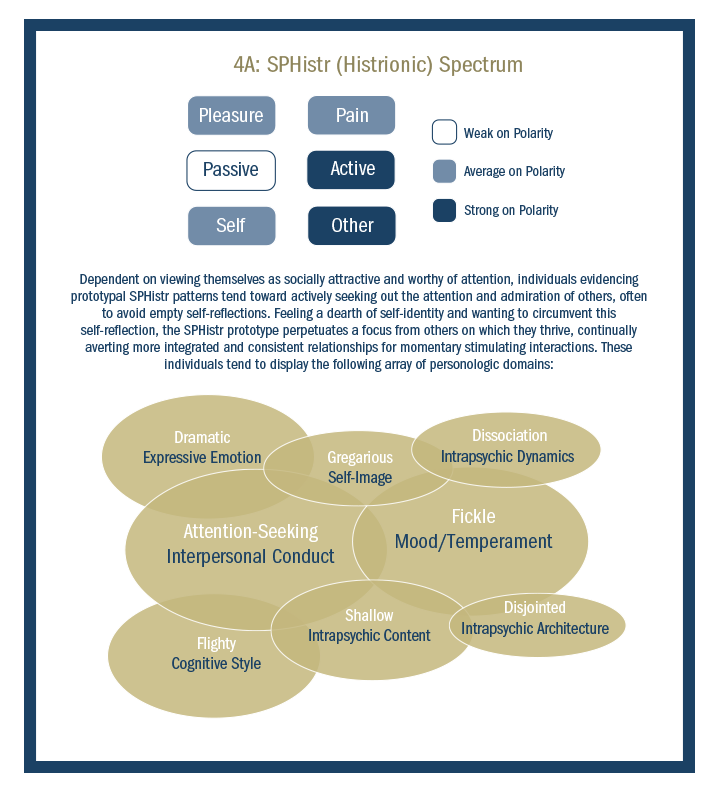
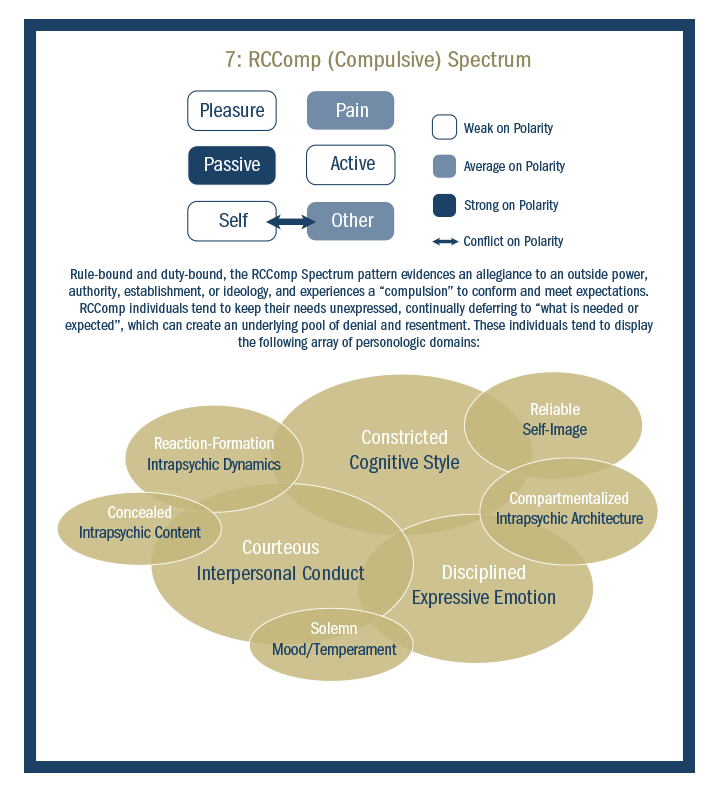
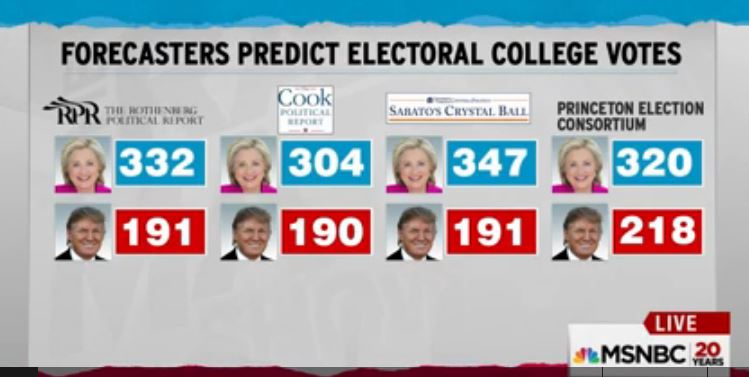
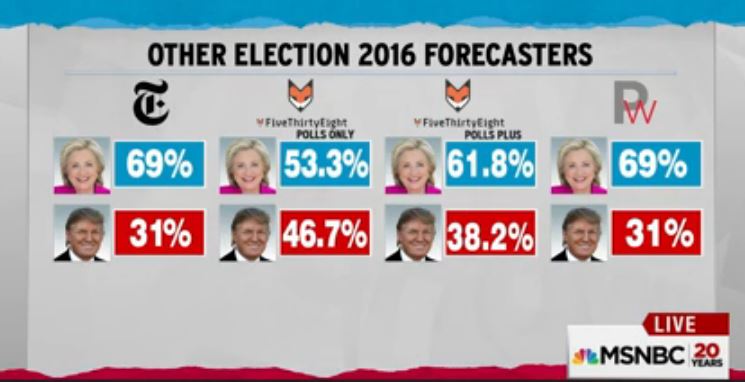









Follow Aubrey Immelman